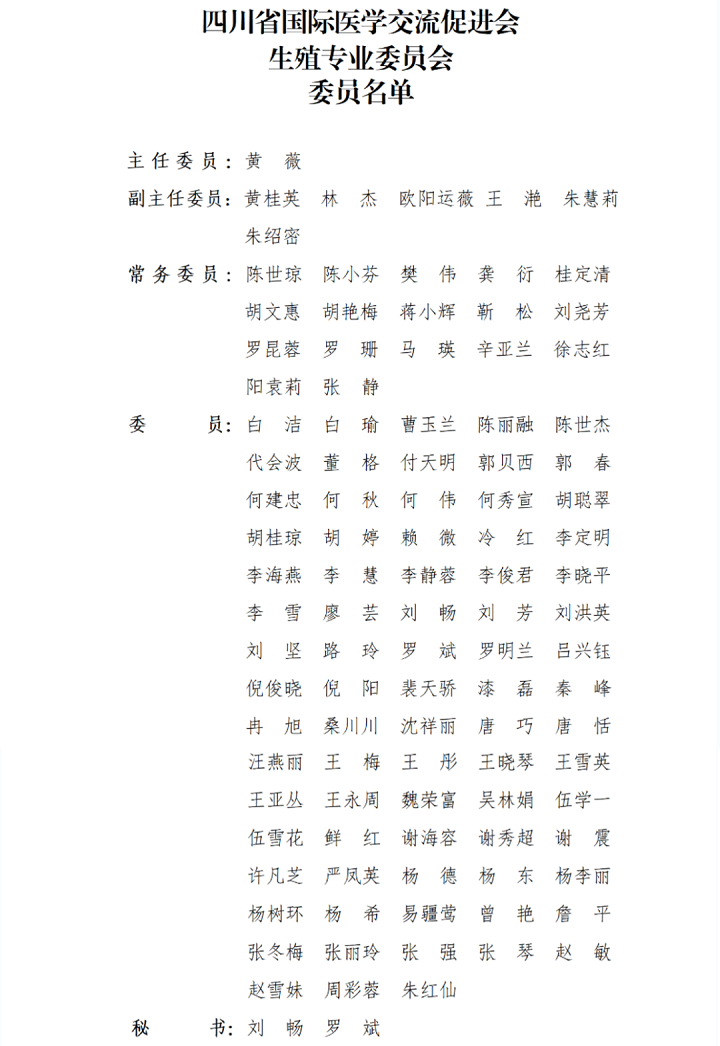Discussing Frontier Issues with Academicians in the Foreground|The First Southwest Reproductive Summit Forum and the Inaugural Meeting of the Special Committee on Reproductive Medicine of SCIMEA Successfully Held

Open the phone and scan
On November 25-27, 2022, the First Southwest Reproductive Summit Forum, co-sponsored by Sichuan International Medical Exchange & Promotion Association (SCIMEA) and West China Second University Hospital of Sichuan University, and co-organized by the Affiliated Hospital of Southwest Medical University, the First Affiliated Hospital of Kunming Medical University, the Affiliated Hospital of Guizhou Medical University, Guiyang Maternal and Child Health Care Hospital, and Chongqing Health Center for Women and Children/ Women and Children's Hospital of Chongqing Medical University, was successfully held.
The inaugural meeting
On the evening of November 25, the inaugural meeting of the Special Committee on Reproductive Medicine of SCIMEA officially kicked off in Chengdu.
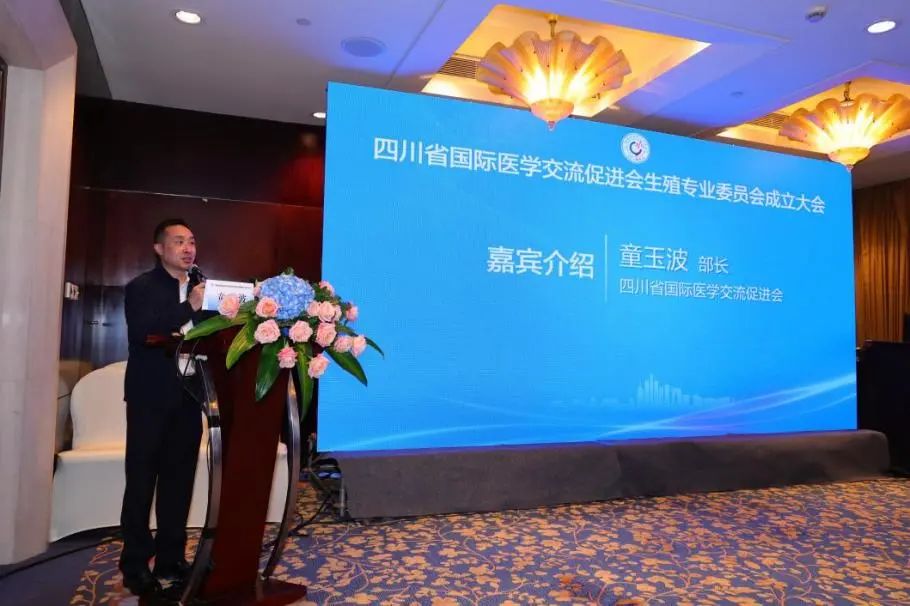
Mr. Tong Yubo, Director of Academic Conference Affairs Department of SCIMEA, presides over the inaugural meeting.
Vice President Yang Zheng of SCIMEA, Prof. Huang Wei, Prof. Ouyang Yunwei and Prof. Zhu Huili from West China Second University Hospital of Sichuan University, Prof. Wang Yan from Sichuan Academy of Medical Sciences/Sichuan Provincial People's Hospital, Prof. Zhu Shaomi from Reproductive & Women-Children Hospital, Chengdu University of Traditional Chinese Medicine and other experts attended this inaugural meeting. In addition, due to the epidemic prevention and control, some experts and members including Prof. Huang Guiying from the Affiliated Hospital of Southwest Medical University and Prof. Lin Jie from Zigong Hospital of Woman and Children Healthcare were unable to attend the meeting in person, but they participated online.
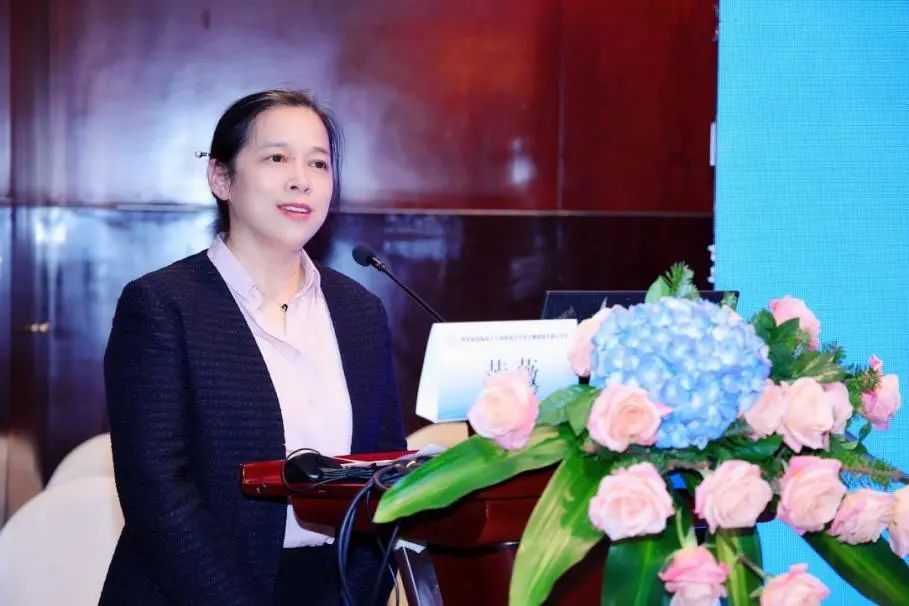
Prof. Huang Wei from West China Second University Hospital of Sichuan University delivers a report on the preparatory work.
The first item of the inaugural meeting was a preparatory report by Prof. Huang Wei, one of the initiators of the Special Committee on Reproductive Medicine of SCIMEA. Prof. Huang Wei mentioned that in recent years, the prevalence of infertility is on the rise, the average age of first marriage and childbearing continues to rise, and the number of elderly mothers driven by the second-child and third-child policy increases continuously in China, which has not only promoted the rapid development of assisted reproductive technology, but also brought more challenges to reproductive medicine workers. Although the reproductive medicine in Sichuan started early, it still lacks resources for assisted reproduction services compared with the developed coastal provinces in eastern China. She hoped that the Special Committee on Reproductive Medicine of SCIMEA will accelerate the high-quality development of reproductive medicine in Sichuan.
Later, Tong Yubo, Director of Academic Conference Affairs Department of SCIMEA, organized the election of the committee and read out the results. And the leaders at all levels of the committee were elected at the scene according to the election provisions in the Articles of Association of Sichuan International Medical Exchange & Promotion Association. As a result, Prof. Huang Wei was elected as chairman with 88 votes, 6 experts including Huang Guiying and Lin Jie as deputy chairmen with 88 votes, 17 experts including Chen Shiqiong and Chen Xiaofen as members of the standing committee with 88 votes, 78 experts including Bai Jie and Bai Yu as members, and Liu Chang and Luo Bin as secretaries.
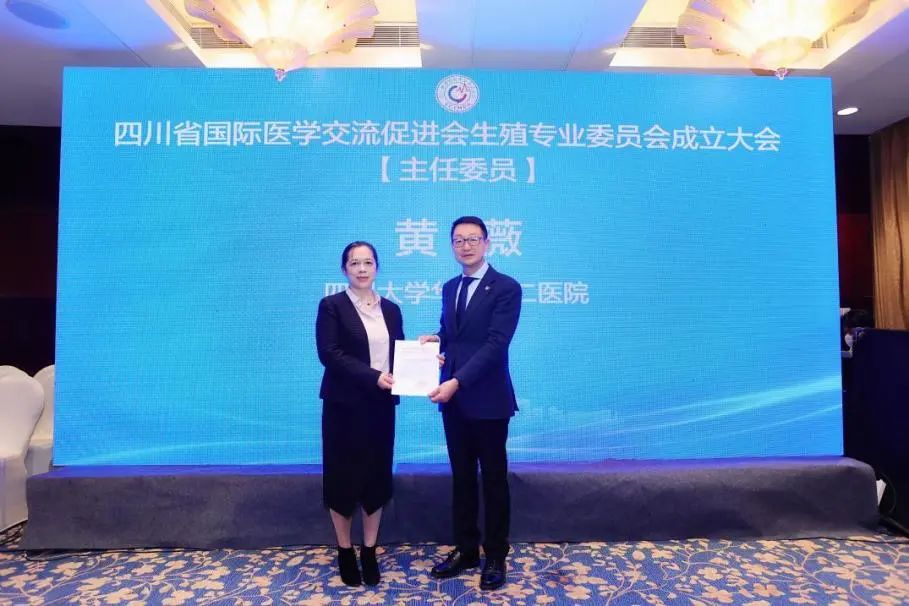
Vice President Yang Zheng reads out and awards the approval for the establishment of the Special Committee on Reproductive Medicine.
Vice President Yang Zheng read out the “Approval for the Establishment of the Special Committee on Reproductive Medicine of Sichuan International Medical Exchange & Promotion Association”, and awarded the approval for the establishment and letter of appointment to the newly-elected chairman Prof. Huang Wei.

Vice President Yang Zheng awards the letter of appointment to Prof. Huang Wei, chairman of the Special Committee on Reproductive Medicine.
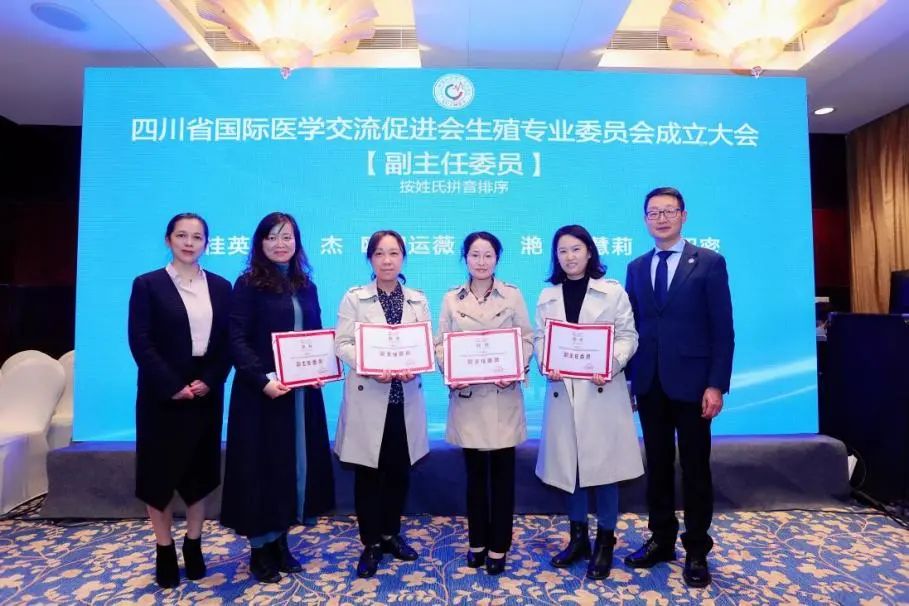
Vice President Yang Zheng and Prof. Huang Wei award the letter of appointment to the deputy chairmen of the Special Committee on Reproductive Medicine.
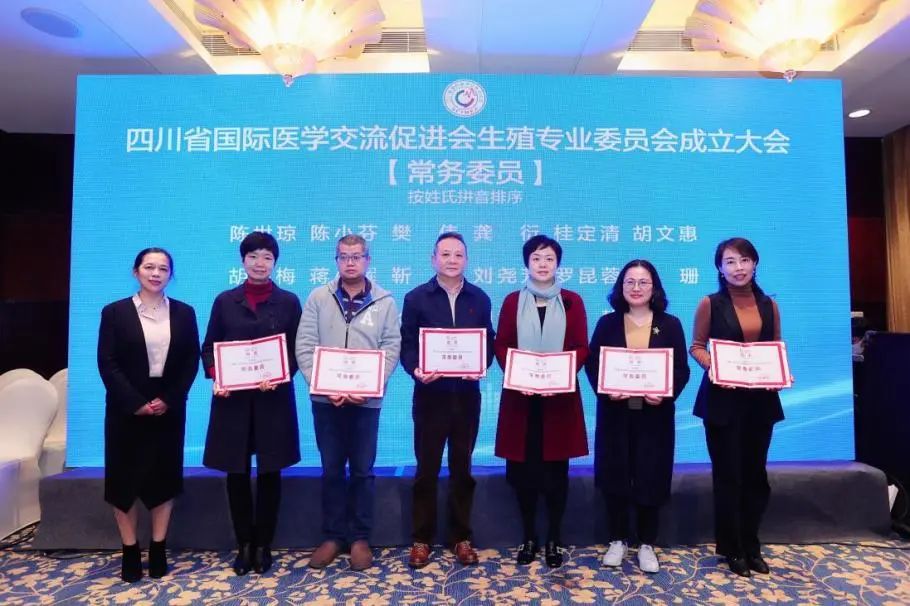
Prof. Huang Wei awards the letter of appointment to the members of the standing committee of the Special Committee on Reproductive Medicine.
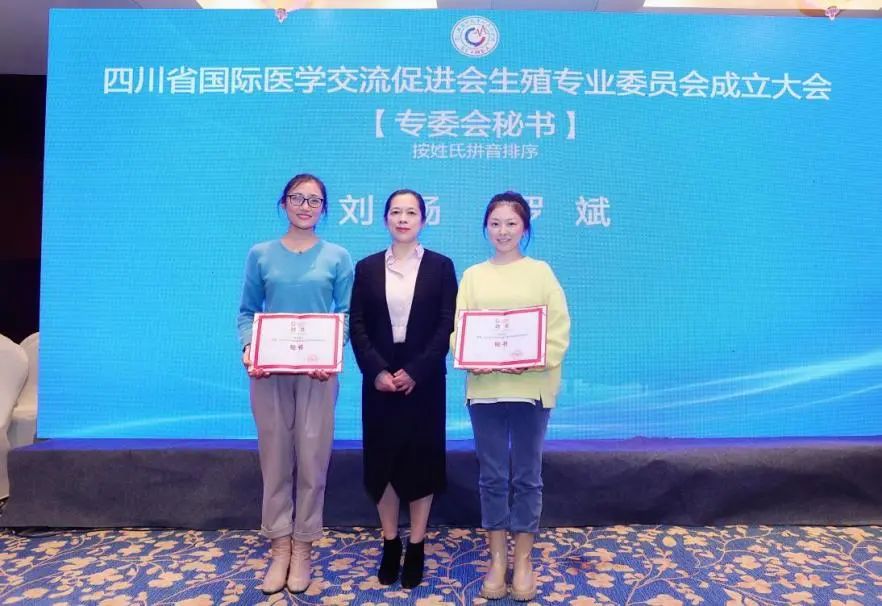
Prof. Huang Wei awards the letters of appointment to the secretaries of the Special Committee on Reproductive Medicine.
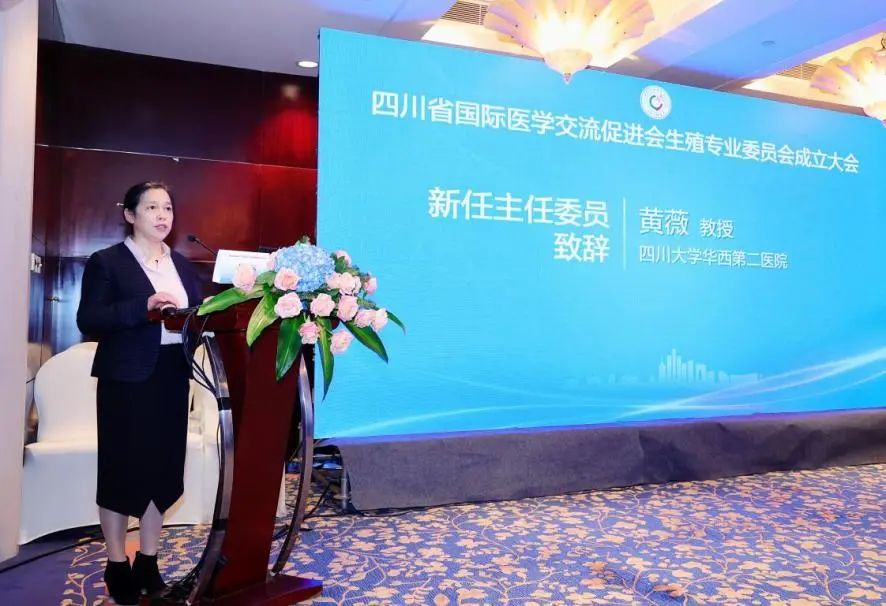
Prof. Huang Wei, chairman of the Special Committee on Reproductive Medicine of SCIMEA, delivers a speech.
Prof. Huang Wei spoke on behalf of all members of the Special Committee on Reproductive Medicine. Prof. Huang said that the committee will actively carry out technical training at the grassroots level and clinical scientific research, strengthen the construction of the talent system, continuously standardize the level of infertility treatment, improve the basic theory and technical ability of grassroots doctors, and contribute to the overall high-quality development of reproductive medicine and assisted reproduction in the southwest region, so as to benefit the infertility patients and their families!
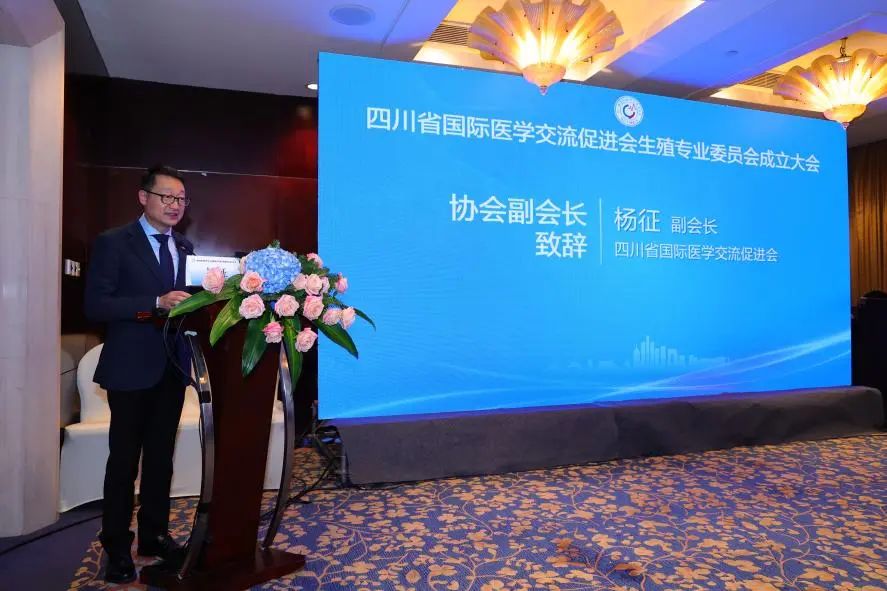
Vice President Yang Zheng delivers a speech.
Vice President Yang Zheng of SCIMEA delivered a speech on behalf of SCIMEA. He noted that Sichuan is facing problems such as uneven service levels among medical institutions, inconsistent standards, the mismatch between the number of assisted reproduction institutions and the population, and uneven spatial distribution. The establishment of the Special Committee on Reproductive Medicine of SCIMEA will bring together the professional forces in the field of reproductive medicine in Sichuan and further improve the standard of reproductive medicine services in Sichuan through active academic exchanges, multidisciplinary collaboration, personnel training, continuing education, clinical research and other discipline construction efforts.
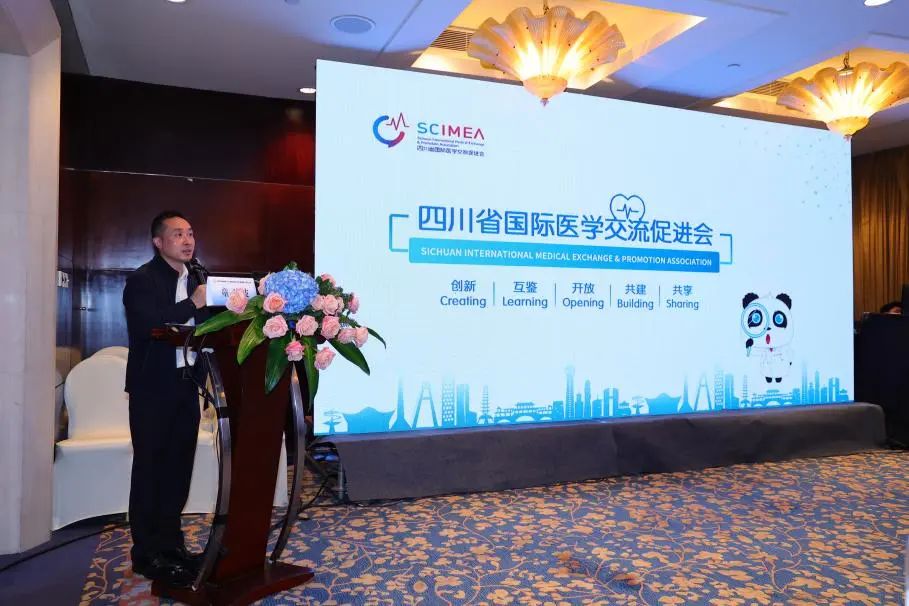
Mr. Tong Yubo, a director from SCIMEA, gives an introduction on SCIMEA.
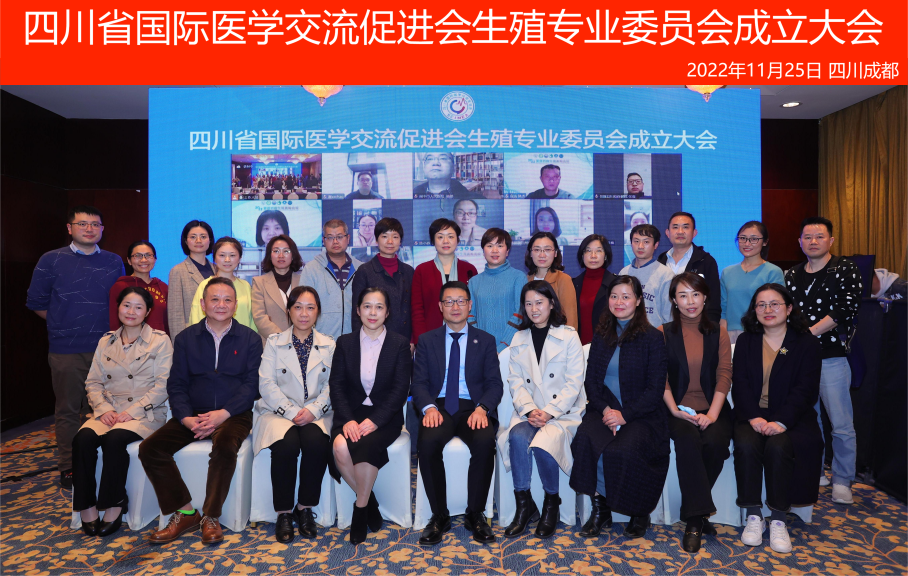
Group photo
Opening ceremony
On November 26, the First Southwest Reproductive Summit Forum, was held online. Mr. Tong Yubo, Director of Academic Conference Affairs Department of SCIMEA, President Jiang Yong of the Affiliated Hospital of Southwest Medical University and Prof. Huang Wei of West China Second University Hospital of Sichuan University were invited to deliver speeches at the opening ceremony.
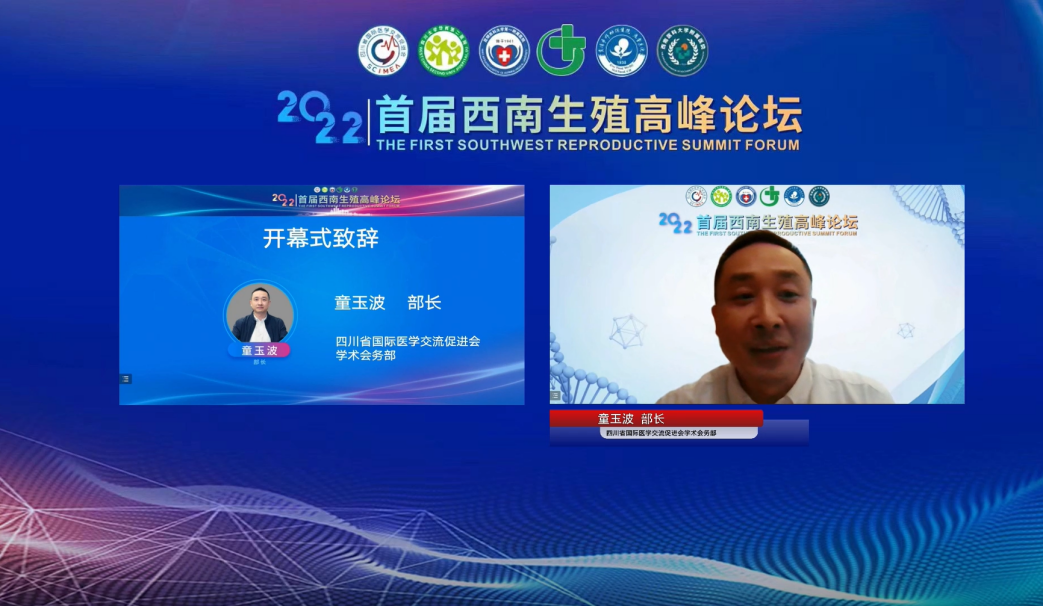
Mr. Tong Yubo, Director of Academic Conference Affairs Department of SCIMEA, delivers a speech.
Director Tong Yubo delivered a speech on behalf of SCIMEA, saying that today's reproductive medicine has achieved comprehensive and vigorous development and plays a crucial role in the great strategic planning of good prenatal and postnatal care in China. He hoped that the forum can further accelerate the implementation of the Health China Initiative, and make more positive exploration to promote the healthcare of women and children, so as to better serve the infertility patients and bring new hope to millions of families! He also hoped that this forum can build a professional academic exchange platform for reproductive medicine, accelerate the construction of reproductive medicine discipline in Sichuan from such aspects as international frontiers, treatment standards and talent training, and contribute more to further improve the high-quality development of reproductive medicine in Sichuan and even in western China!
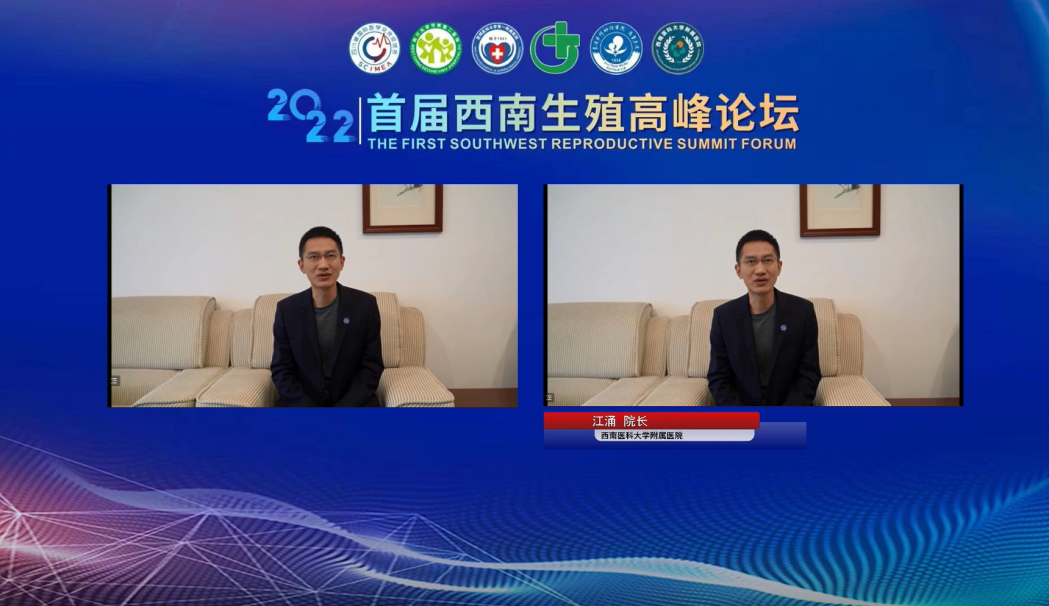
President Jiang Yong of the Affiliated Hospital of Southwest Medical University delivers a speech.
President Jiang Yong mentioned that the Affiliated Hospital of Southwest Medical University is the first hospital in southern Sichuan to carry out assisted reproduction technology, and its Department of Human Assisted Reproductive Medicine has possessed advanced medical equipment and a high-quality talent team. The forum is not only an opportunity for all medical workers in reproductive medicine in southwestern China to learn advanced ideas, new knowledge and new technology, but also an important opportunity for the hospital to further improve the service capacity of reproductive medicine! In the future, the hospital will continue to play a good role in southern Sichuan, train high-quality professional physicians, build a high-level professional technology platform, provide more powerful support and guarantee, and make new contributions to improve the regional reproductive medicine treatment and promote the long-term development of reproductive medicine.

Prof. Huang Wei from West China Second University Hospital of Sichuan University delivers a speech.
Prof. Huang Wei warmly congratulated on the forum and expressed her heartfelt thanks to all the experts for their hard work. She noted that “population issues” have always been given high priority, as the State Council decided to “optimize the fertility policy and promote long-term balanced population development” in 2021 and the 20th National Congress of the Communist Party of China clearly instructed “give strategic priority to ensuring the people’s health”. Infertility not only plagues couples of reproductive age, but also affects the harmony of families and social and economic development. Reproductive medicine in southwestern China started early and developed rapidly, but there are still problems such as unbalanced treatment capacity in different regions, hence we must accelerate the pace of development and improve the treatment level. She hoped that through the academic platform of this forum, we can strengthen academic exchange and continuing education, enhance the professional skills of workers in this field, and bring babies to infertility couples in southwestern China!
Academician and committee chairman forum
This forum is the first academic summit held in the field of reproductive medicine in southwest China, led by a team of experts in the field of reproduction from Sichuan, Yunnan, Guizhou and Chongqing. The forum invited the leaders of various disciplines who have long supported the development of reproductive medicine in southwest China to conduct academic exchange, including Academician Qiao Jie from Peking University Third Hospital, Academician Huang Hefeng from Reproductive and Developmental Research Institute of Fudan University, Academician Chen Zijiang from Hospital for Reproductive Medicine Affiliated to Shandong University, Prof. Li Rong from Peking University Third Hospital, Prof. Huang Guoning from Chongqing Health Center for Women and Children, and Prof. Tian Weidong from West China Hospital of Stomatology of Sichuan University. These authoritative domestic experts exchanged views centering on the frontier technologies and hot issues such as reproductive medicine, reproductive immunology, reproductive genetics, reproductive endocrinology and fertility preservation.
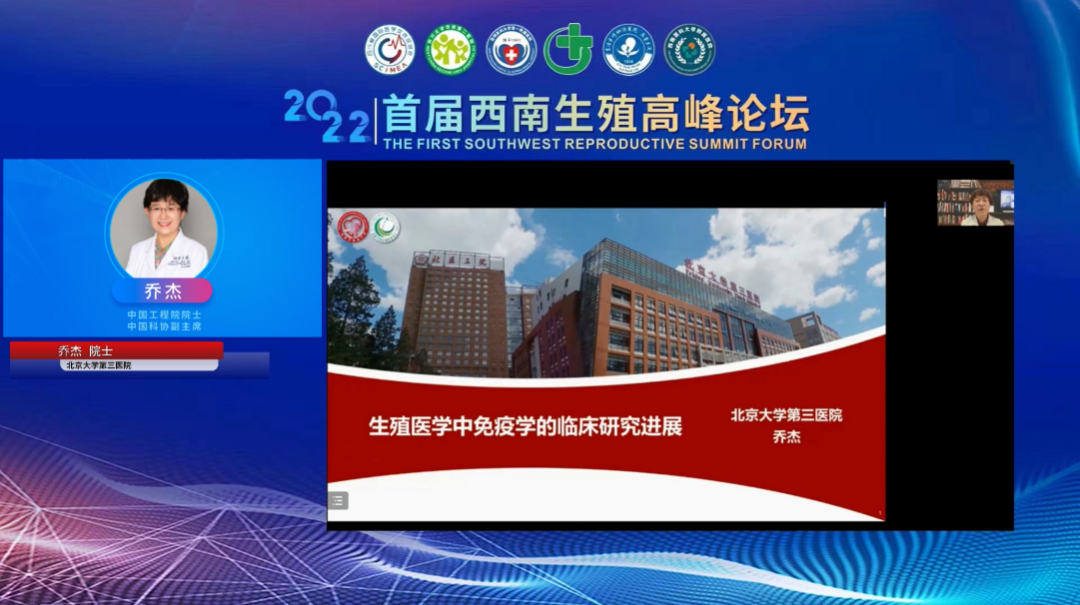
“Clinical Research Progress of Immunology in Reproductive Medicine”, by academician Qiao Jie, Peking University Third Hospital
Academician Qiao Jie gave a keynote speech on “Clinical Research Progress of Immunology in Reproductive Medicine”. She systematically reviewed the development of reproductive immunology. The publication of “temporal and spatial development of fetal immune cell” was the first time to discover and verify the existence of human B1 cells, the “vanguard” of the B-cell family, which are carriers of natural immunity and secrete natural antibodies. Microenvironmental changes (nutritional status and composition of the microbiome) can alter the development and function of the immune system in males and females in different ways. She stressed the maternal-fetal immune regulation of ovum development and embryo implantation in reproduction, and the impact of the immune status of the body on reproduction. In combination with the literature, she comprehensively outlined the polycystic ovary syndrome, the premature ovarian failure, and the relationship between recurrent miscarriage patients and the immune system. In the end, she provided a comprehensive overview of the development of immunity in reproduction and guided the reproductive medicine peers to further understand the clinical progress of reproductive immunity.
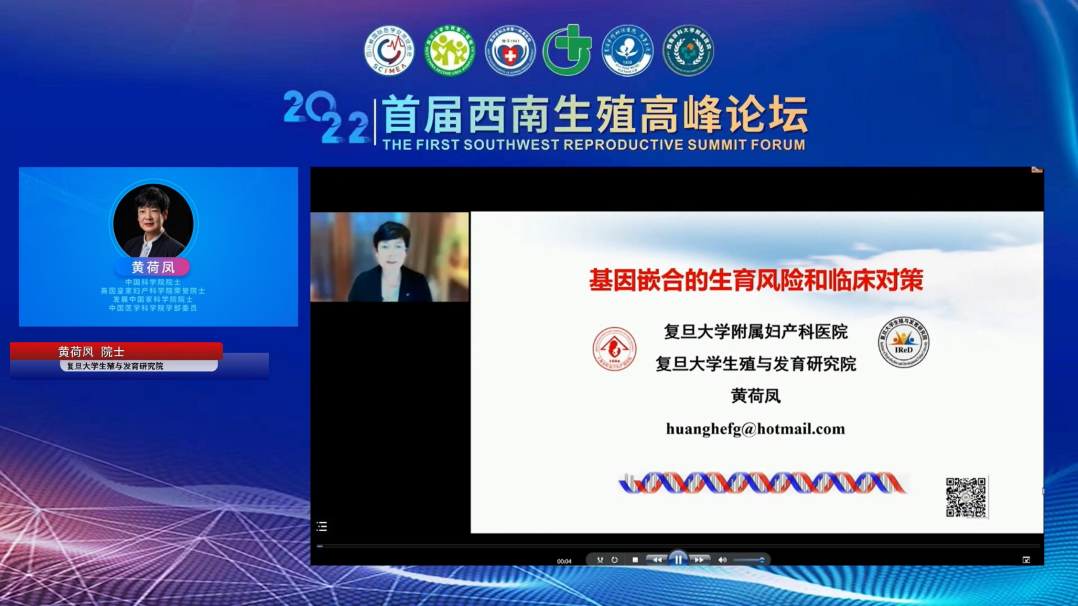
“Fertility Risks of Genetic Chimerism and Clinical Countermeasures ” , by Academician Huang Hefeng, Obstetrics & Gynecology Hospital of Fudan University/Reproductive and Developmental Research Institute of Fudan University
Academician Huang Hefeng gave a keynote presentation on “Fertility Risks of Genetic Chimerism and Clinical Countermeasures”, introducing the concept of chimera or mosaic through the special clinical cases of “NCBRS syndrome” and “identical twins with different phenotypes”, which is a genetic term used to refer to individuals with different genetic trait chimerism or mixed expressions (including chromosome and gene). There are chimeras, mosaics, and genetic chimeras and mosaics (cytoplasmic genetic chimeras/mosaics and nuclear genetic chimeras/mosaics). She suggested gene bank construction should leverage AI+5G big data, cloud computing, and ultrasound remote MDT diagnosis platform to help solve genetic defects and summarized clinical diagnosis and treatment strategies for genetic diseases and genetic chimeric diseases.
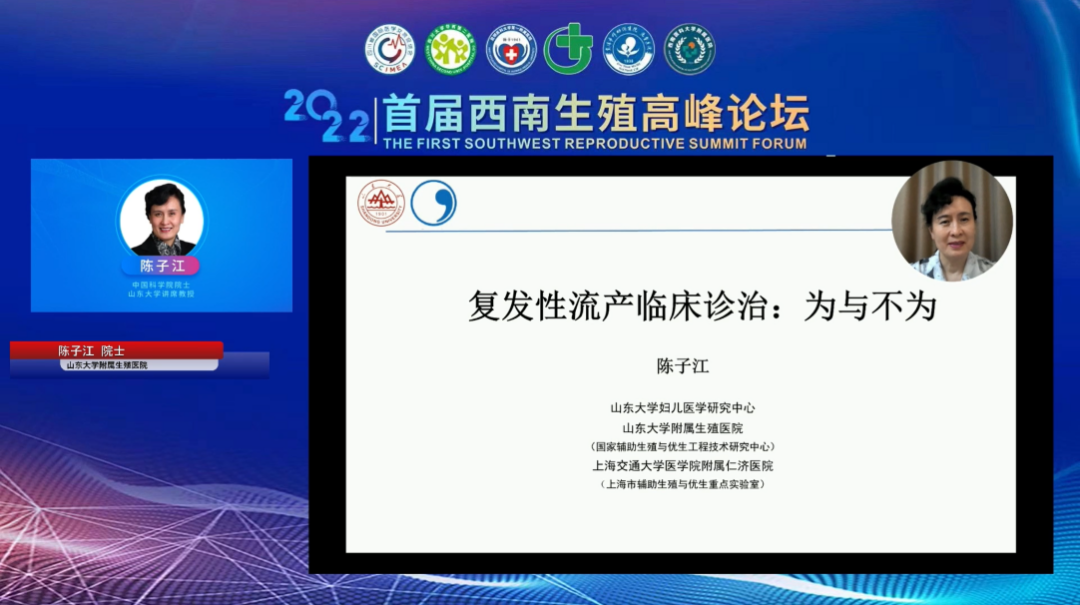
“Clinical Diagnosis and Treatment of Recurrent Miscarriage: Do's and Don'ts”, by Academician Chen Zijiang, Hospital for Reproductive Medicine Affiliated to Shandong University
Academician Chen Zijiang gave a keynote speech on “Clinical Diagnosis and Treatment of Recurrent Miscarriage: Do's and Don'ts”, citing three papers published in The Lancet in 2021 and the resulting call for "a thorough rethinking of attitudes regarding miscarriage". She proposed the “do's and don'ts” in the clinical diagnosis and treatment of recurrent miscarriages, an issue worth thinking. She also cited examples of “excessive don'ts” and “excessive do's” in medical practice in the social. She dissected the diversity of the etiology of miscarriage by analyzing genetic factors, anatomical factors, pre-thrombotic state, endocrine factors, immune factors, infectious factors and other adverse factors. For recurrent miscarriage treatment, there are still some differences between Chinese and foreign experts' consensus, by comparing the similarities and differences. Prof. Chen concluded that for the clinical diagnosis and treatment of recurrent miscarriage, we should not forget the original intention, and must be patient-oriented and do what should be done but not do as we want.
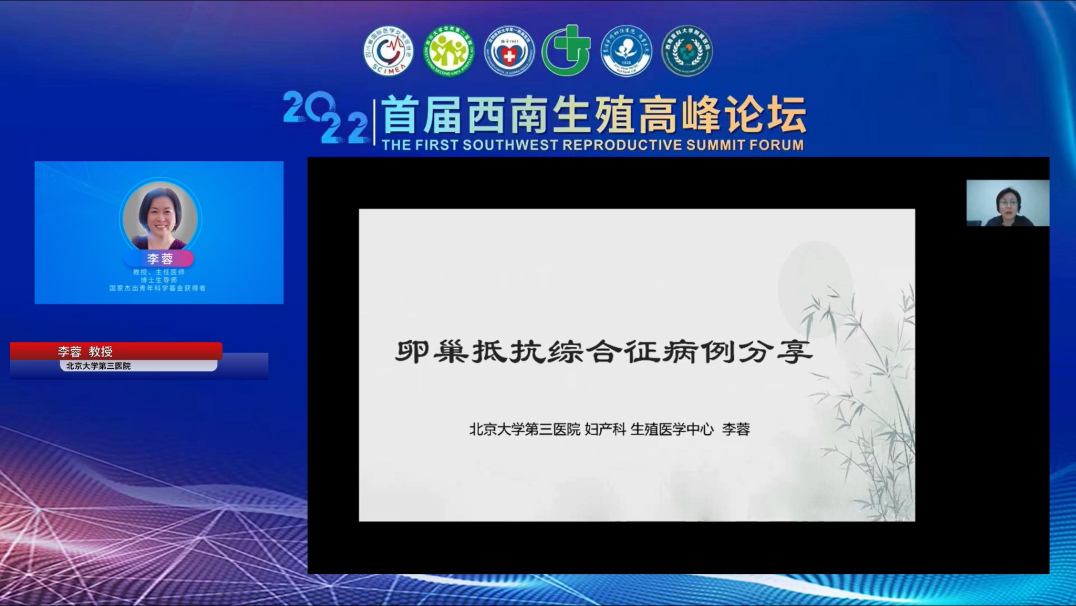
“Case Sharing of Resistant Ovary Syndrome”, by Prof. Li Rong, Peking University Third Hospital
Prof. Li Rong from the Third Hospital of Peking University gave a presentation on “Case Sharing of Resistant Ovary Syndrome”. She vividly explained the etiology, diagnosis, differential diagnosis, treatment and fertility treatment plan of ROS with clinical cases. She also pointed out that the ROS mainly relies on clinical diagnosis, manifested by normal development of secondary sex characteristics, normal karyotype analysis, significantly elevated serum FSH level, normal AMH and ovarian imaging, and normal sinus follicles. It needs to be differentiated from ovarian insufficiency and premature ovarian failure, and there are differences in treatment principles. The infertility treatment of ROS is tricky, with poor response to ovulation induction and relying on this treatment only equals forgoing the chance to reproduce. The potentially effective treatment options are the pituitary downregulation regimen and the IVM regimen, and the successful cases mostly are independent. Occasionally, the patients with spontaneous ovulation have a better chances of pregnancy after treatment. Repeated verification of blood hormone levels, multiple oral ovulatory drugs or experimental exogenous Gn therapy may not be beneficial but only prolong the treatment duration and add patients’ burden.
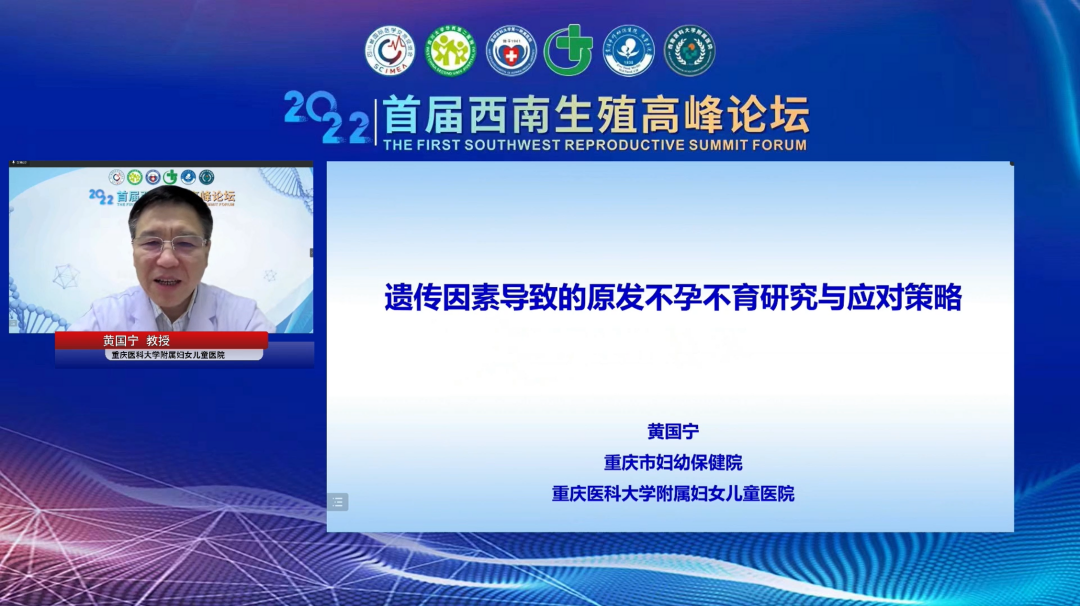
“Research on Primary Infertility Caused by Genetic Factors and Coping Strategies”, by Prof. Huang Guoning, Women and Children's Hospital of Chongqing Medical University/Chongqing Health Center for Women and Children
Infertility is an important public health problem that affects up to 190 million couples worldwide, which is caused by a variety of causes related to male and/or female factors. Prof. Huang Guoning from Chongqing Medical University/Chongqing Health Center for Women and Children gave a fascinating lecture on “Research on Primary Infertility Caused by Genetic Factors and Coping Strategies”, focusing on several cases of primary infertility caused by genetic factors. He briefly reviewed the genetic basis of human oogenesis, fertilization and early embryonic developmental abnormalities in conjunction with recent research, and provided physicians and researchers in reproductive medicine with references for basic theory and clinical practice.
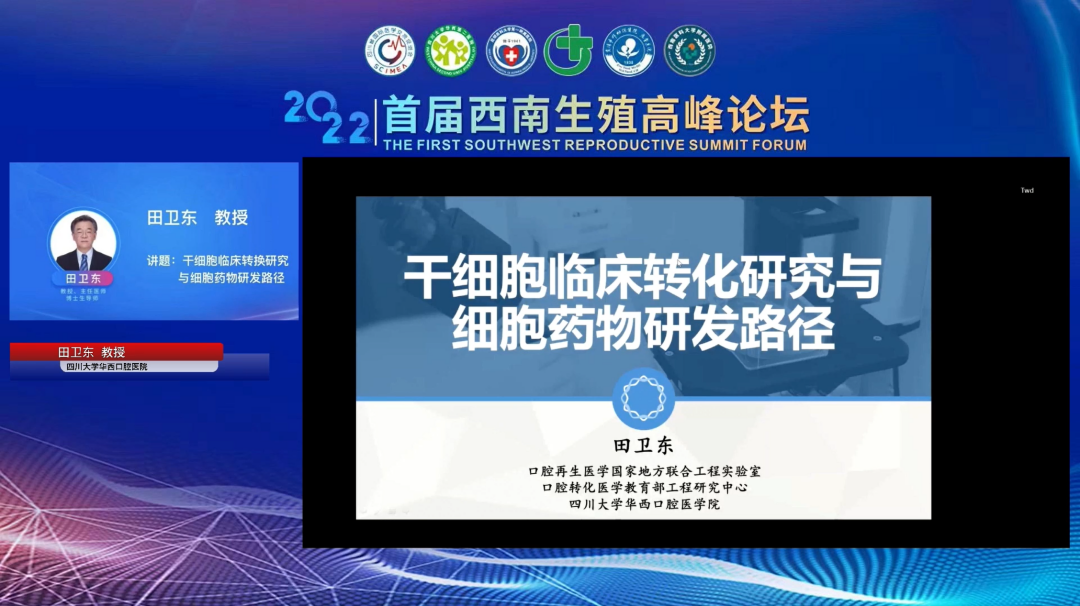
“Stem Cell Clinical Translational Research and Cellular Drug Development Pathway”, by Prof. Tian Weidong, West China Hospital of Stomatology of Sichuan University
From basic research to clinical application, new progress has continuously been made in the field of stem cells, making it a long-term medical hot issue. Prof. Tian Weidong from West China Hospital of Stomatology of Sichuan University shared his insights on “Stem Cell Clinical Translational Research and Cellular Drug Development Pathway”. Relying on his decades of practical experience in stem cell clinical research and results transformation, he gave an in-depth analysis and summary on four aspects: stem cell industry policies and regulations, cell industry process, stem cell clinical research project filing process, and stem cell clinical research project filing materials, providing a practical path for the experts and peers present.
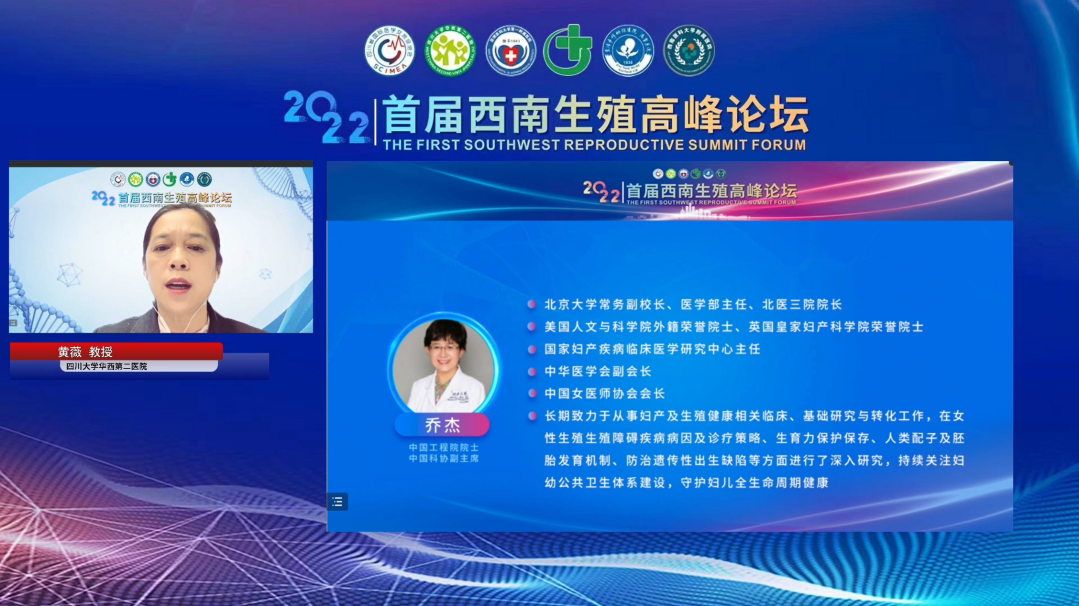
Prof. Huang Wei chairs the academic session.
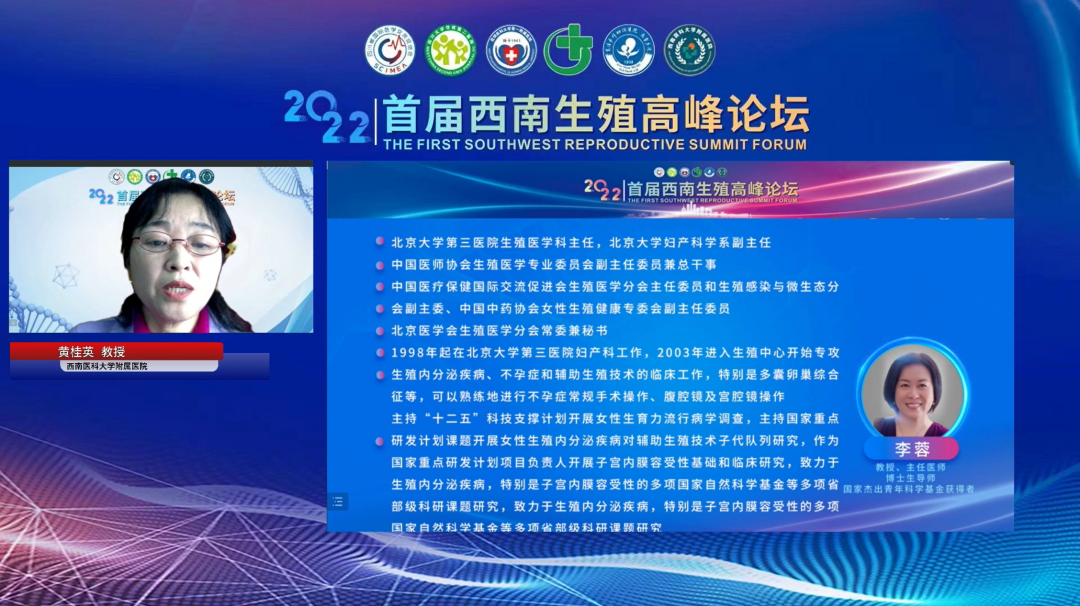
Prof. Huang Guiying chairs the academic session.
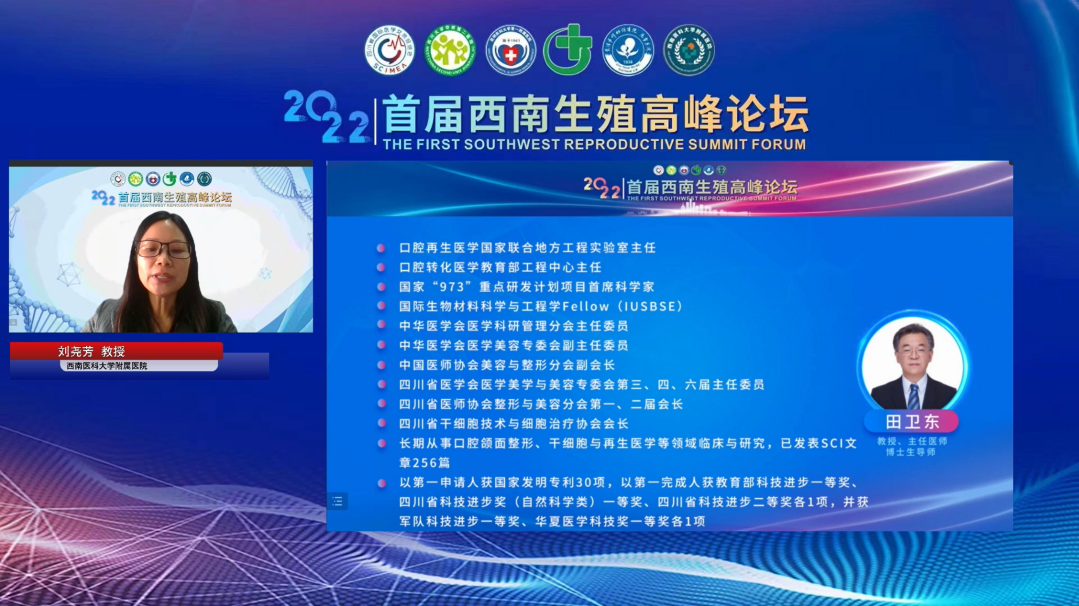
Prof. Liu Yaofang chairs the academic session.
After the academician and committee chairman forum, the participating experts discussed and talked in depth in the two sub-forums with the respective theme of fertility preservation and reproduction basics & common diseases and miscarriage in an online manner around the frontier advances and hot issues of basic medicine, clinical practice, scientific research and new technologies in reproductive medicine.
On the afternoon of November 26
Forum on fertility preservation and reproduction basics & common diseases
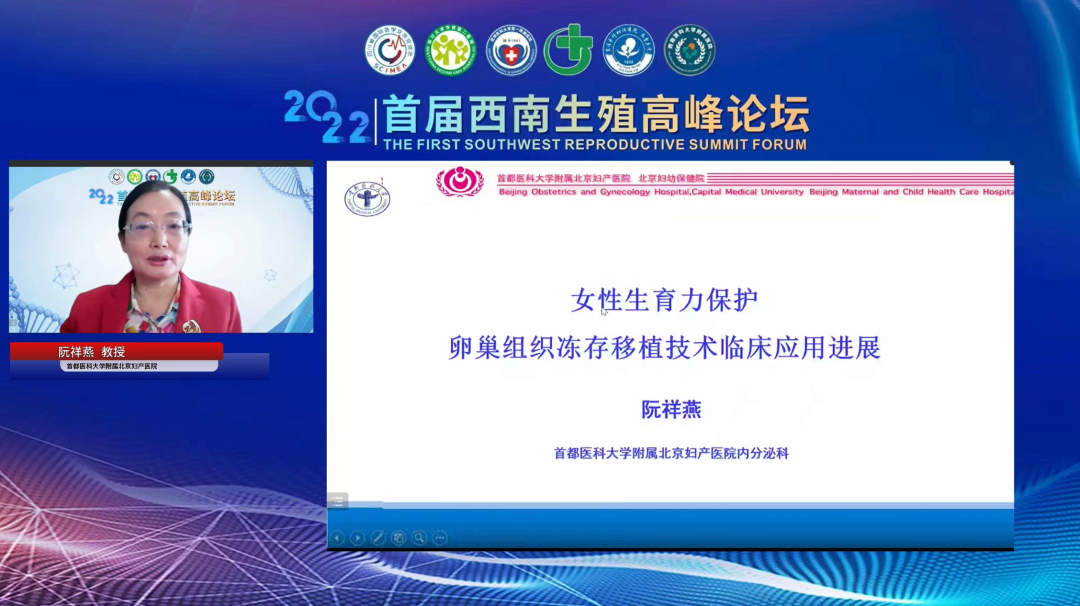
“Fertility Preservation in Women: Advances in Clinical Application of Ovarian Tissue Freezing and Transplantation Technology”, by Prof. Ruan Xiangyan, Beijing Obstetrics and Gynecology Hospital, Capital Medical University
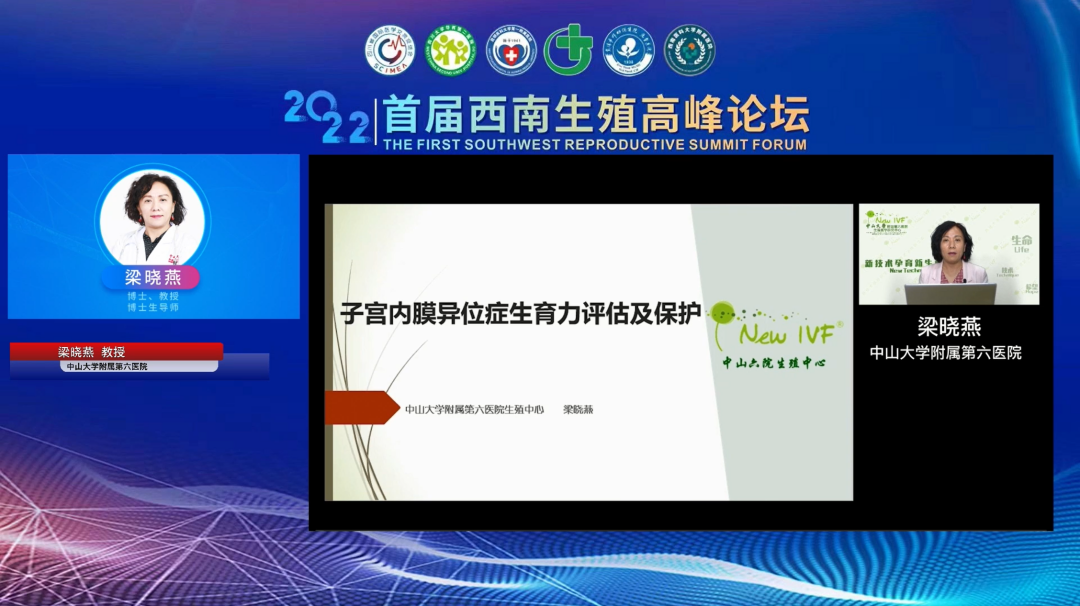
“Fertility Assessment and Preservation for Endometriosis”, Prof. Liang Xiaoyan, The Sixth Affiliated Hospital, Sun Yat-sen University
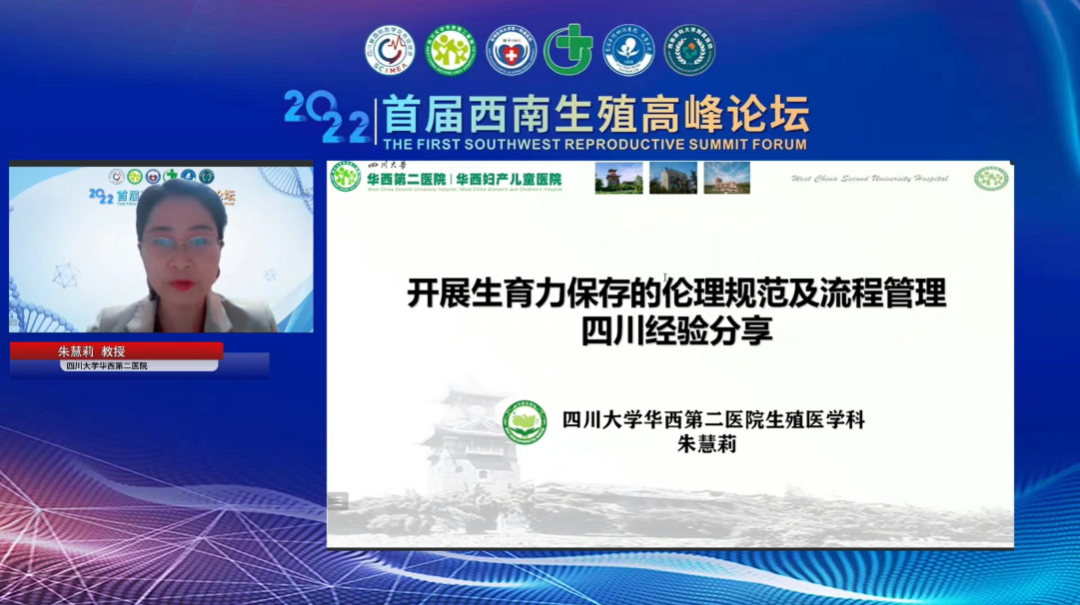
“Ethical Regulation and Process Management of Fertility Preservation: Experience Sharing of Sichuan”, Prof. Zhu Huili, West China Second University Hospital of Sichuan University
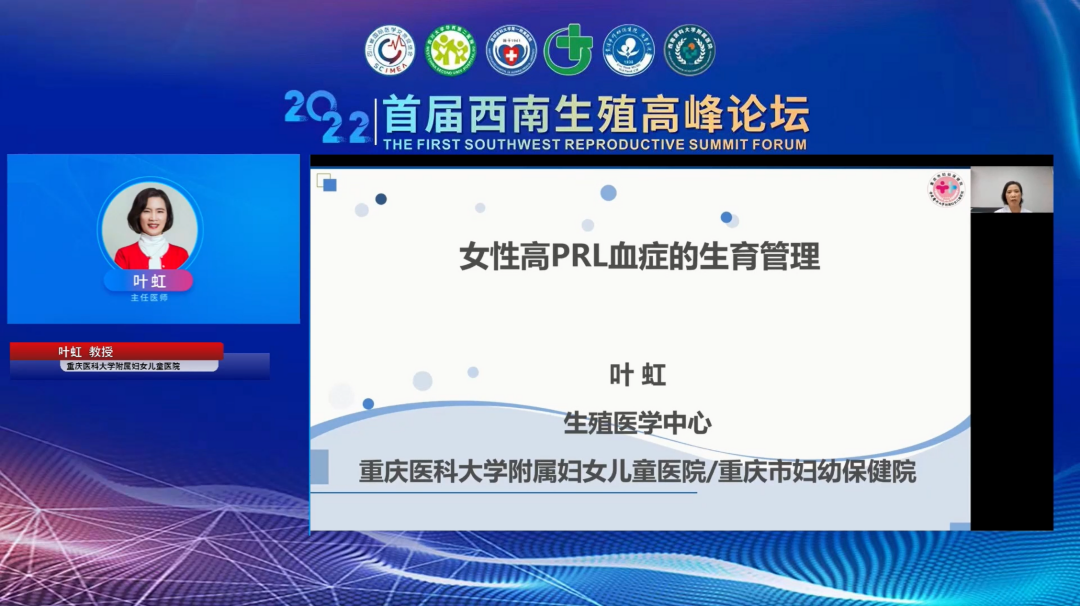
“Fertility Management in Women with Hyper-PRLemia”, Prof. Ye Hong, Chongqing Medical University/Chongqing Health Center for Women and Children
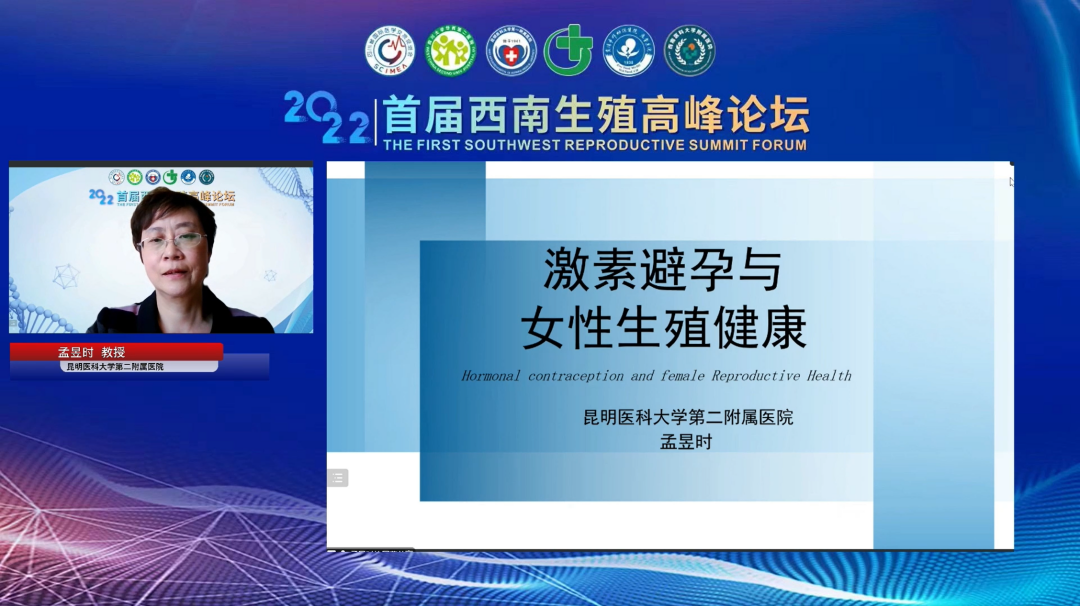
“Hormonal Contraception and Female Reproductive Health”, by Prof. Meng Yushi, The Second Affiliated Hospital of Kunming Medical University
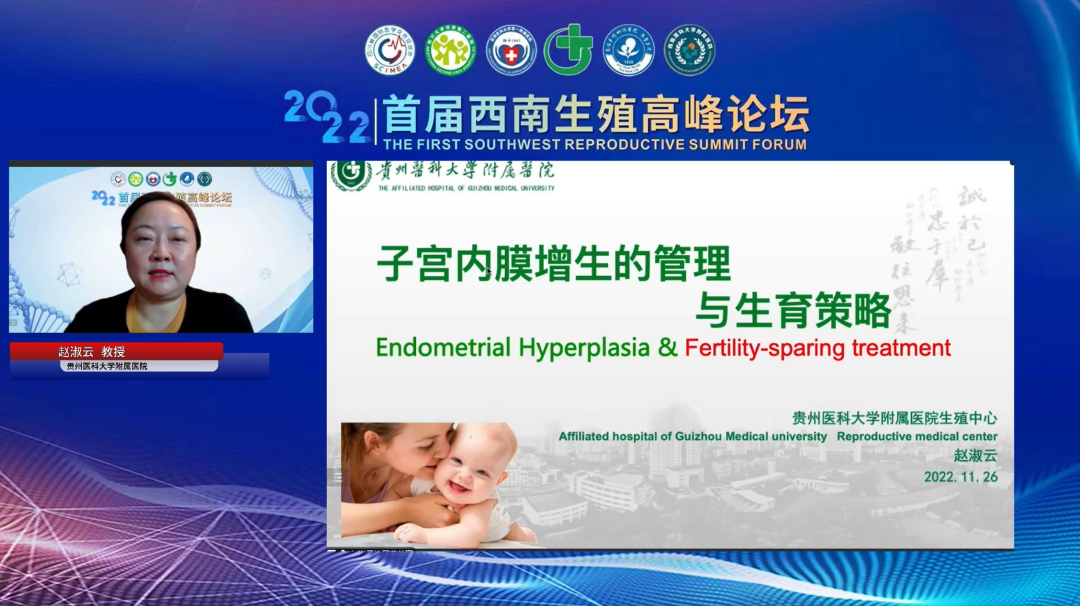
“Endometrial Hyperplasia & Fertility-sparing Treatment”, by Prof. Zhao Shuyun, Affiliated Hospital of Guizhou Medical University
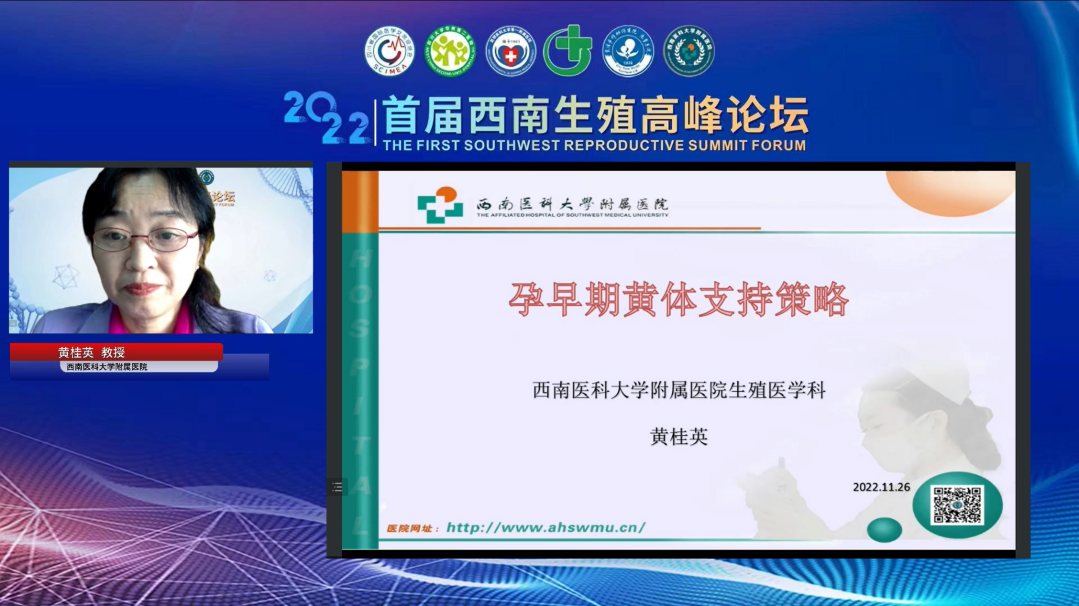
“Strategies for Luteal Support in Early Pregnancy”, by Prof. Huang Guiying, Affiliated Hospital of Southwest Medical University
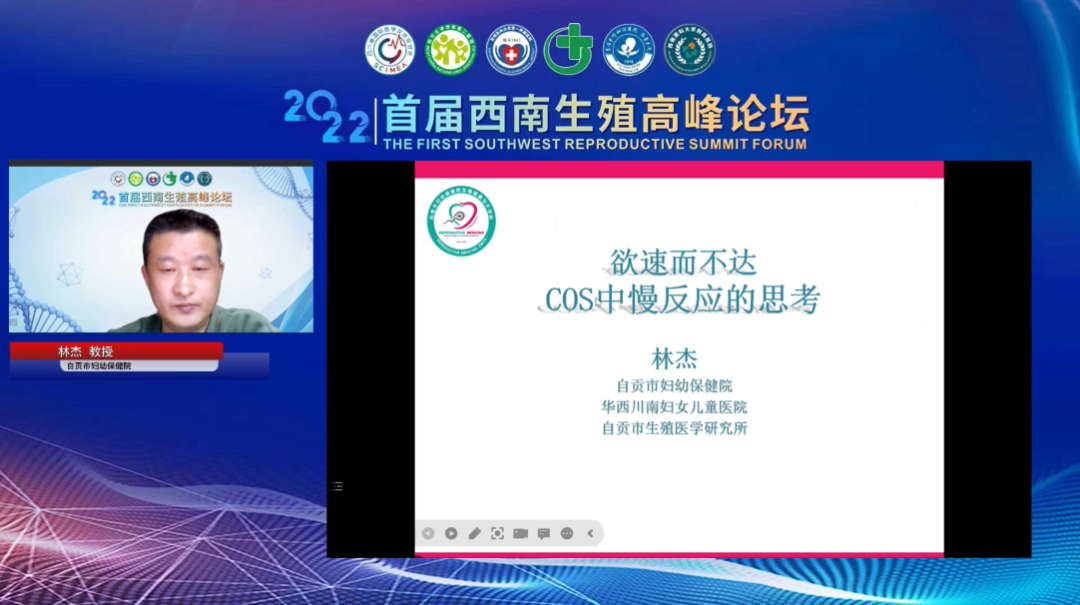
“Haste Makes Waste: Reflection on Slow Response in COS”, by Prof. Lin Jie, Zigong Hospital of Woman and Children Healthcare
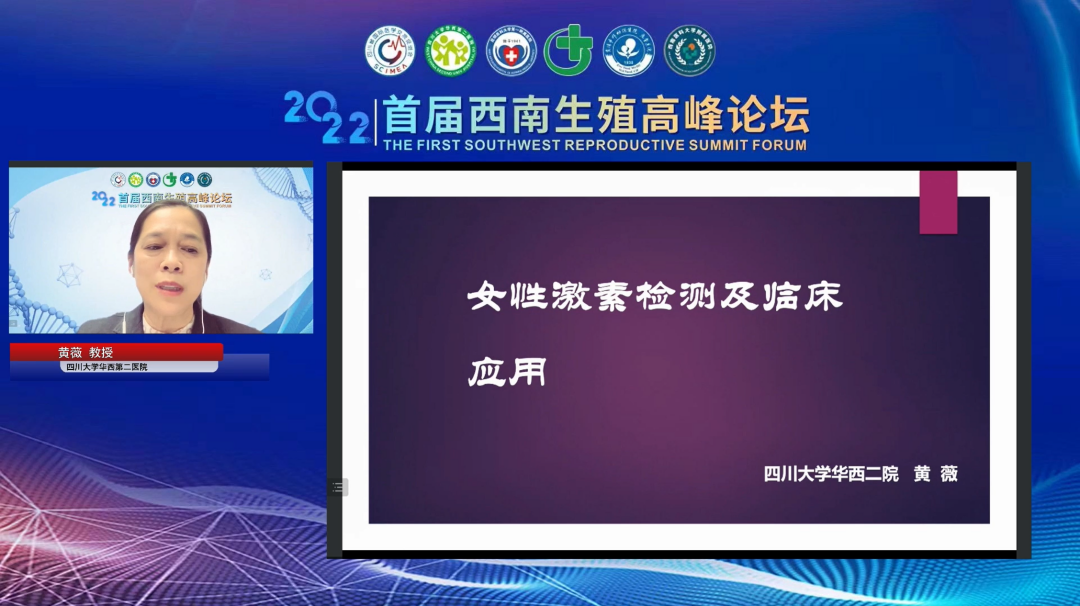
“Female Hormone Testing and Clinical Application”, by Prof. Huang Wei, West China Second University Hospital of Sichuan University

Prof. Gong Yan chairs the academic session.
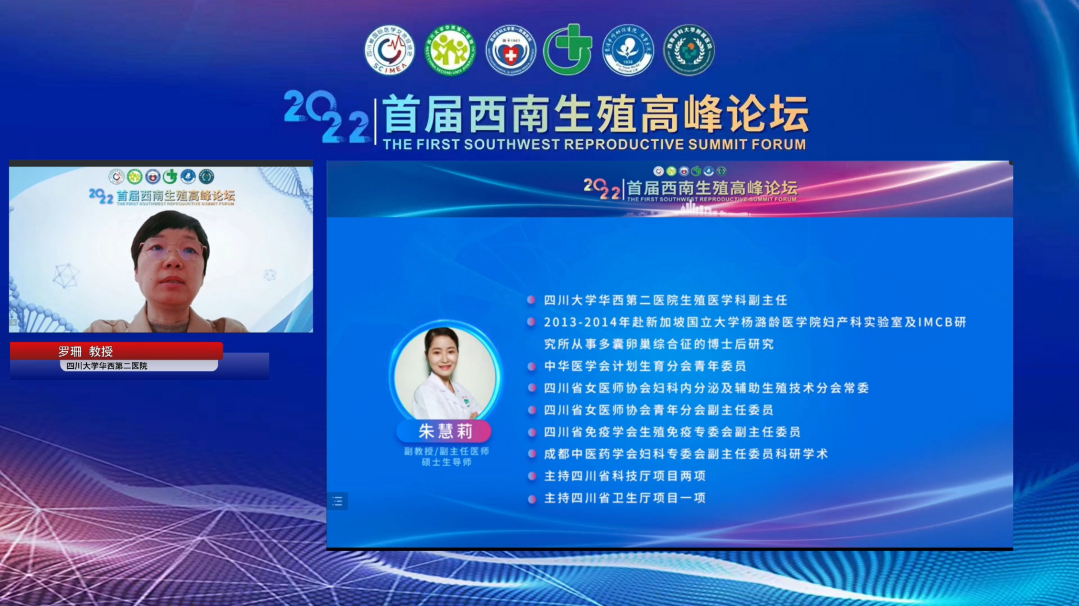
Prof. Luo Shan chairs the academic session.
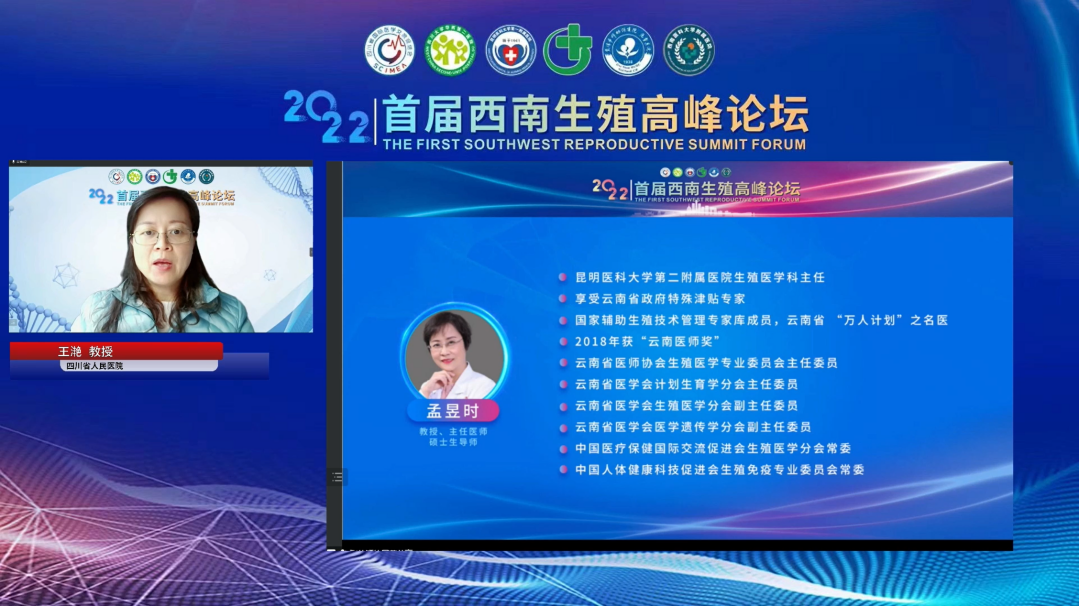
Prof. Wang Yan chairs the academic session.
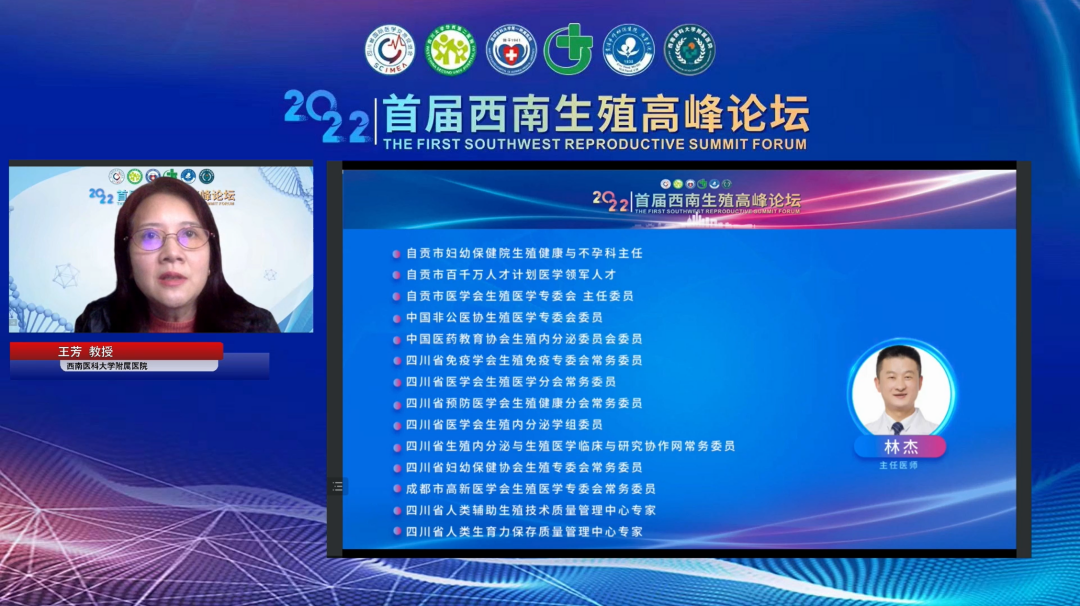
Prof. Wang Fang chairs the academic session.
On the morning of November 27
Forum on miscarriage
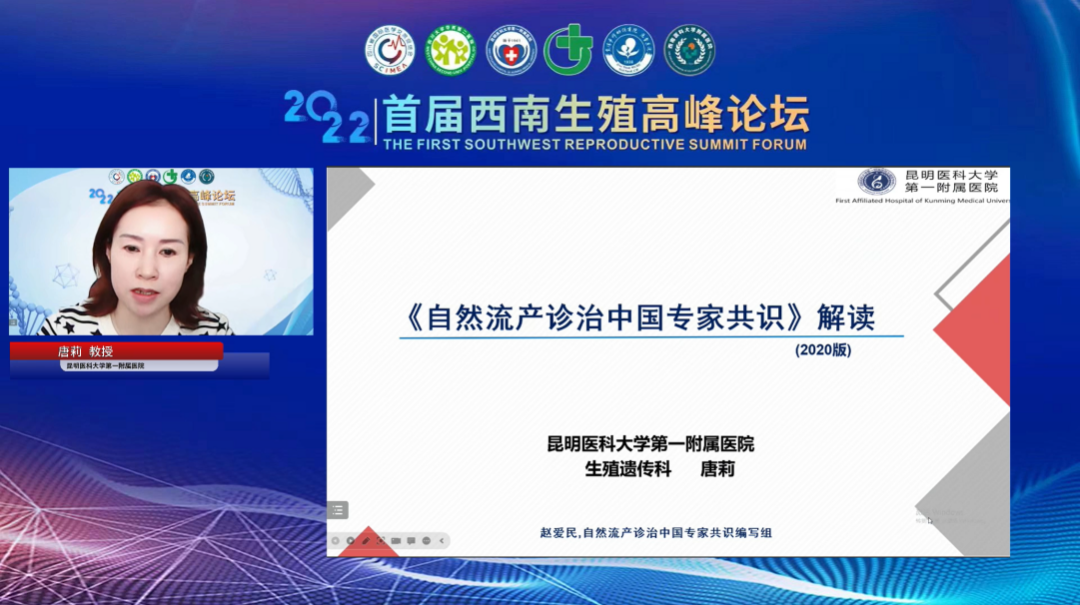
“Interpretation of the ‘Chinese Expert Consensus on the Diagnosis and Treatment of Spontaneous Abortion’”, by Prof. Tang Li, The First Affiliated Hospital of Kunming Medical University

“Application of Immunosuppressants in Recurrent Miscarriage”, by Prof. Cui Ruomei, The First Affiliated Hospital of Kunming Medical University
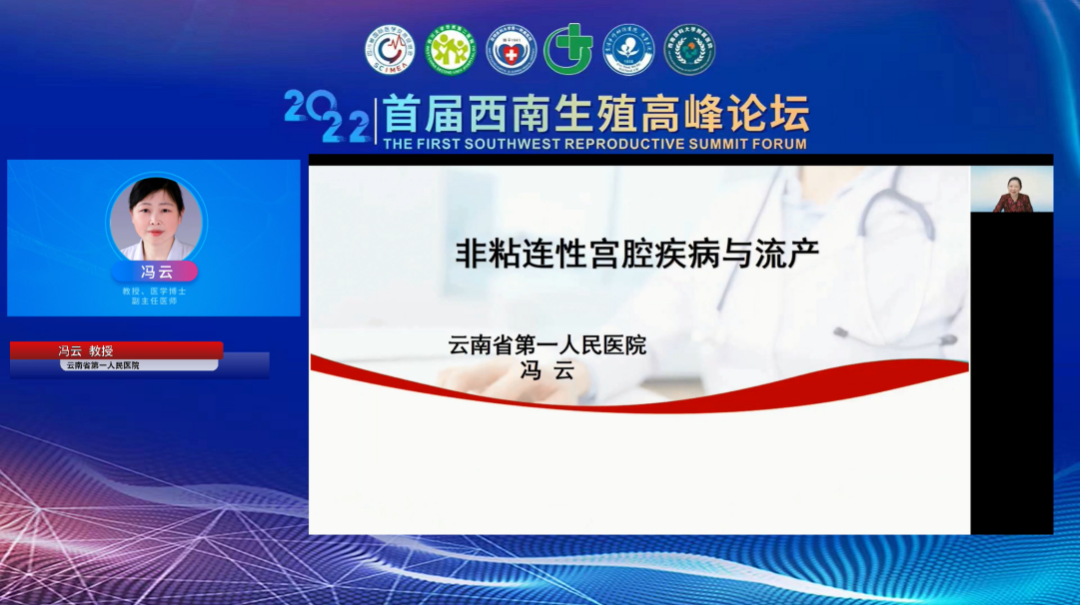
“Non-adherent Uterine Disease and Miscarriage”, by Prof. Feng Yun, First People's Hospital of Yunnan Province
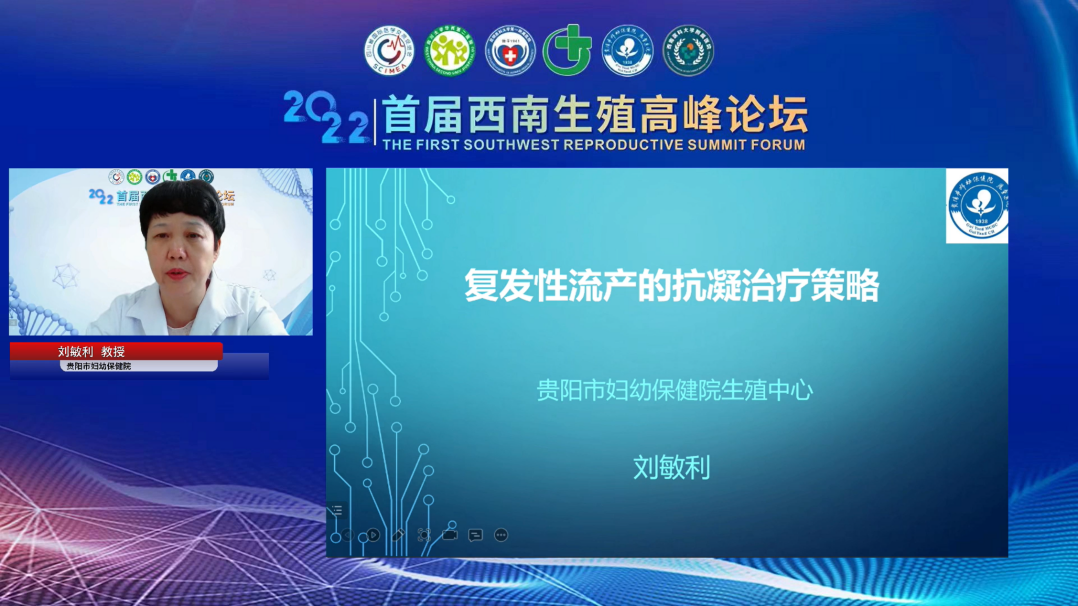
“Strategy of Anticoagulation Treatment for Recurrent Miscarriage”, by Prof. Liu Minli, Guiyang Maternal and Child Health Care Hospital
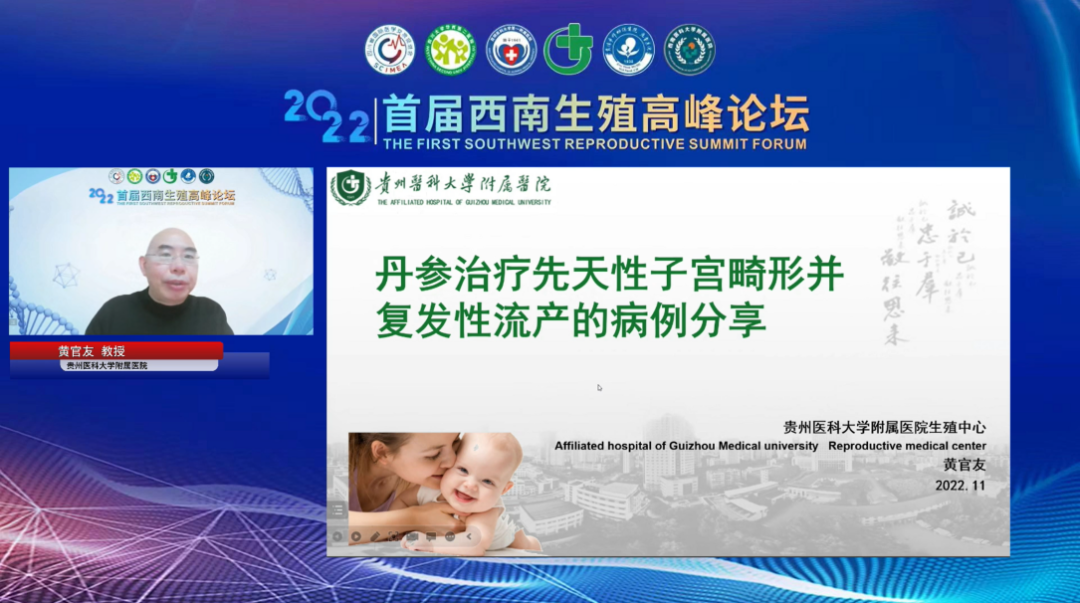
“Case Sharing of Congenital Uterine Malformation with Recurrent Miscarriage Treated with Salvia Miltiorrhizan”, by Prof. Huang Guangyou, Affiliated Hospital of Guizhou Medical University

“Case Study of Recurrent Miscarriage Associated with UCTD”, by Prof. Liu Yaofang, Affiliated Hospital of Southwest Medical University
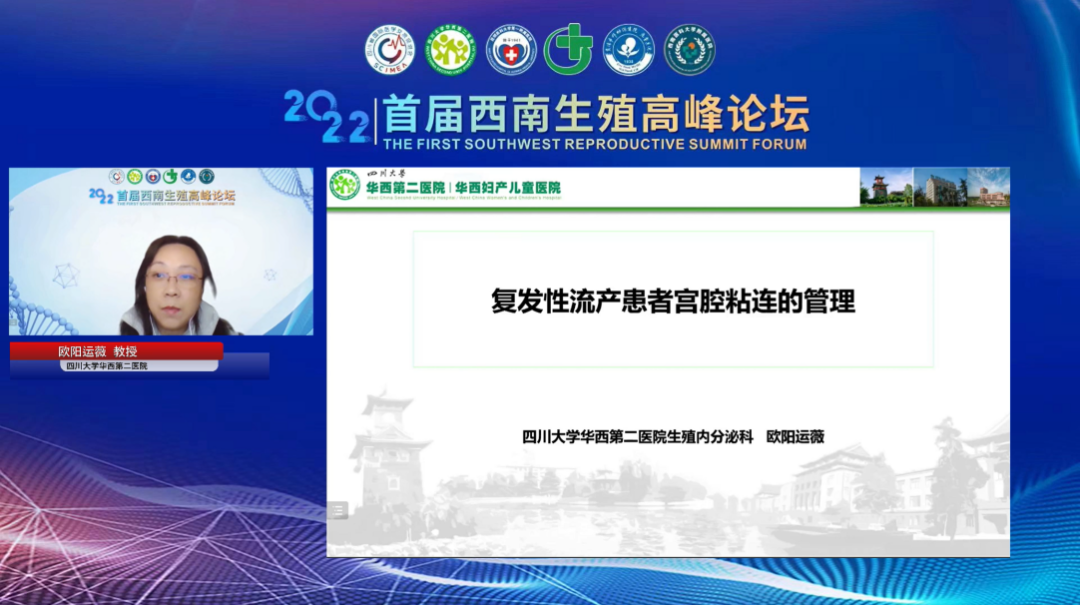
“Management of Uterine Adhesions in Patients with Recurrent Miscarriage”, by Prof. Ouyang Yunwei, West China Second University Hospital of Sichuan University
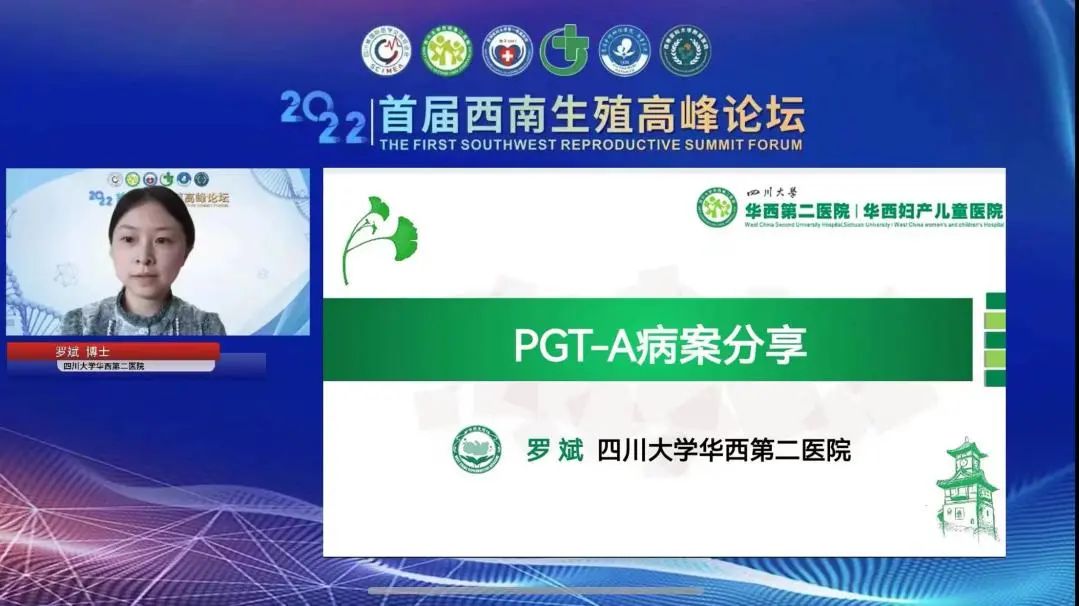
“PGT-A Case Sharing", by Luo Bin, PhD, West China Second University Hospital of Sichuan University
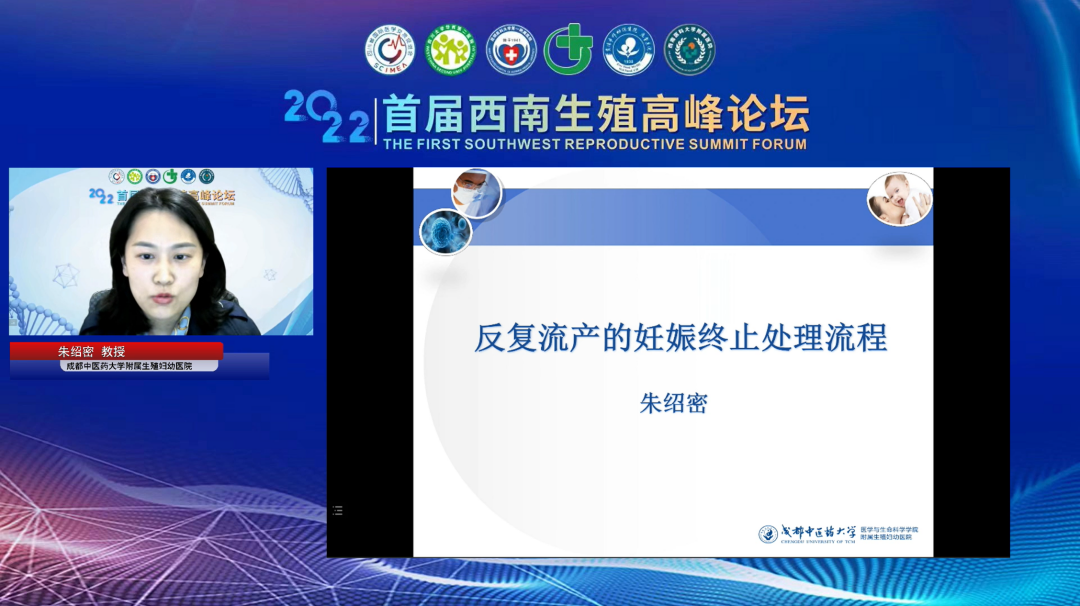
“Procedure of Pregnancy Termination in Recurrent Miscarriage”, by Prof. Zhu Shaomi, Reproductive & Women-Children Hospital, Chengdu University of Traditional Chinese Medicine
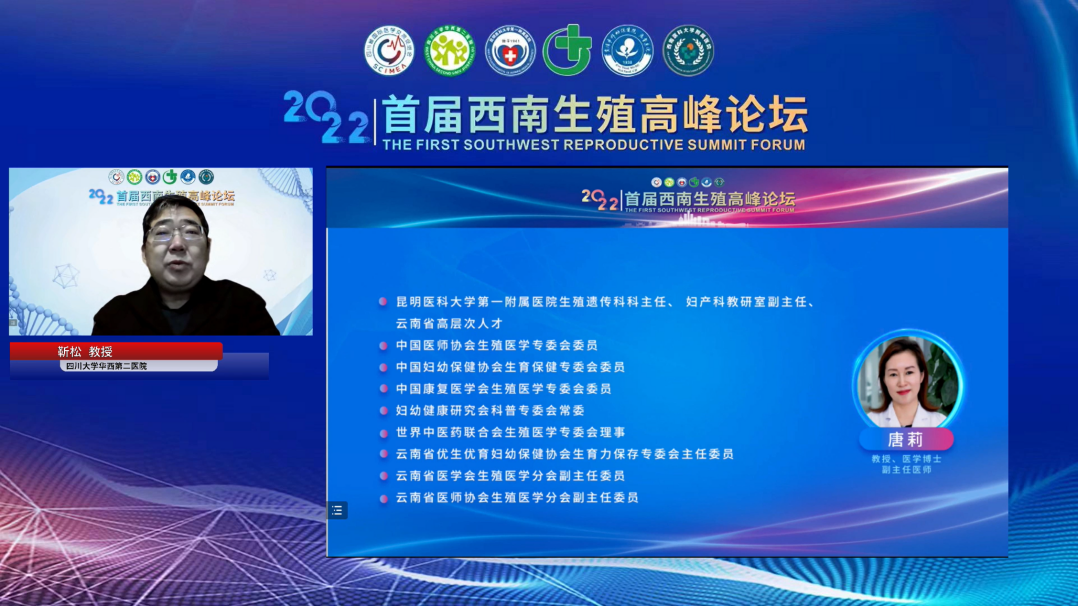
Prof. Jin Song chairs the academic session.
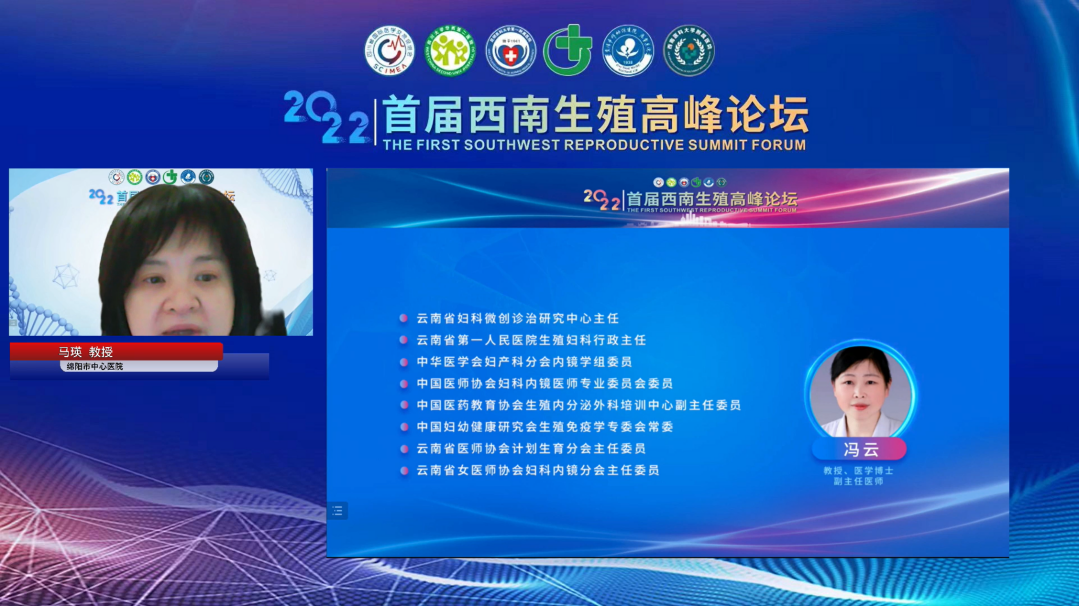
Prof. Ma Ying chairs the academic session.
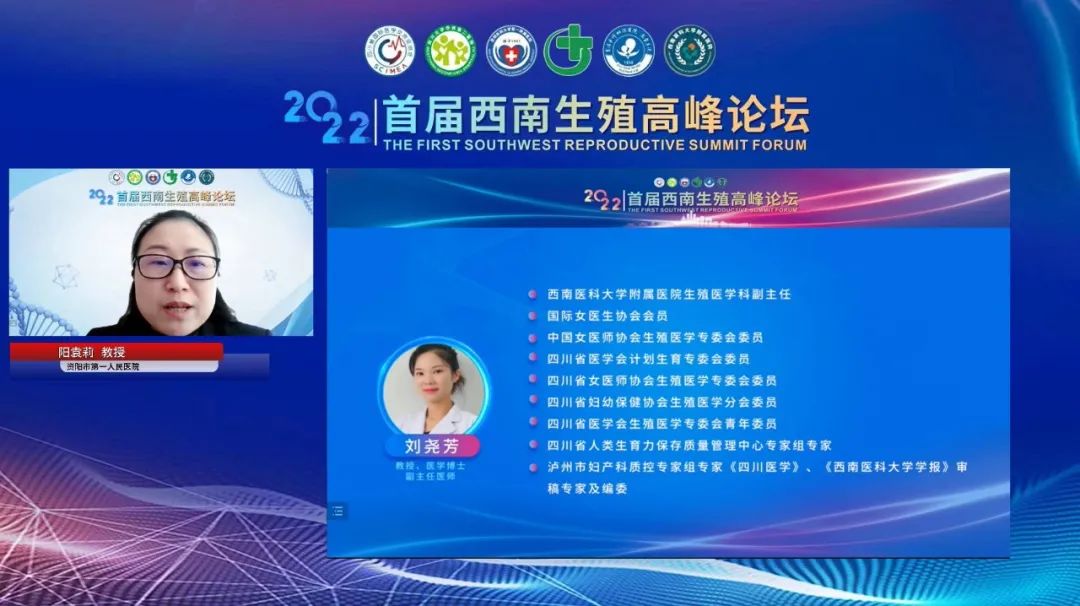
Prof. Yang Yuanli chairs the academic session.
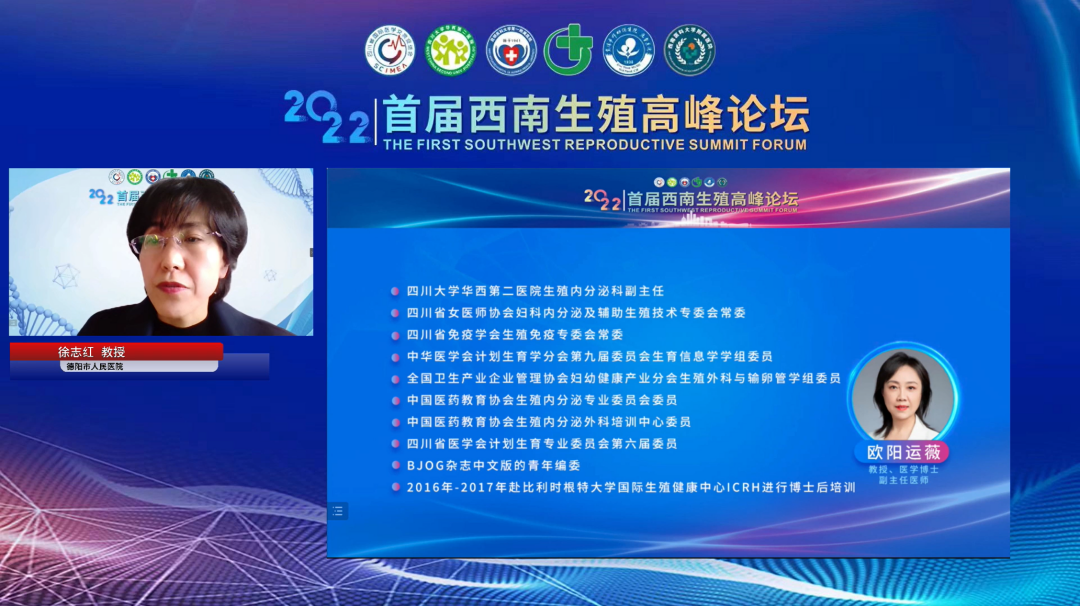
Prof. Xu Zhihong chairs the academic session.
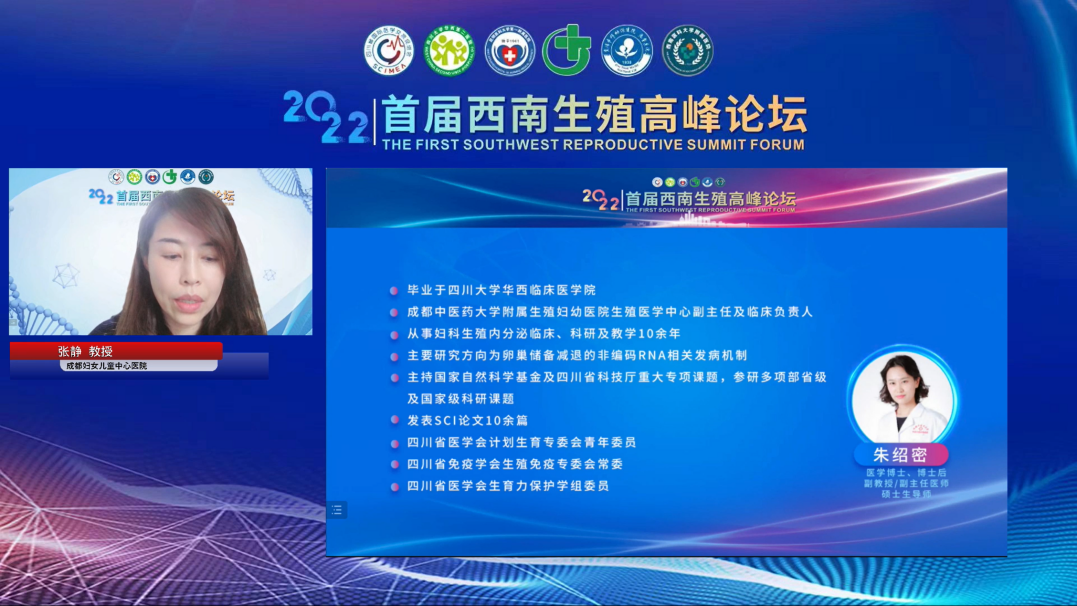
Prof. Zhang Jing chairs the academic session.
The forum was actively participated by peers in obstetrics and gynecology and reproductive medicine in southwest China and even the whole country. A total of three academicians and many academic leaders from inside and outside the province were invited to hold one main forum, two sub-forums, six keynote presentations and 18 special presentations. A total of 11,600 people were attracted to watch the event online.
At the same time, doctors in the comment section were not only studying the wonderful academic lectures, but also interacting frequently with each other on difficult and doubtful issues, showing dense atmosphere for learning. This event was a great opportunity to raise the fire of hope for maternal and child health and reproduction in this cold winter day.
So far, the First Southwest Reproductive Summit Forum were successfully completed all the agendas and ended on November 27. Our sincere appreciation goes to all the experts who contributed their wisdom without reservation as well as all the pees in reproductive medicine who participated with their heart. Let’s meet again next year to talk about the frontier issues in reproductive medicine!
Annex: Member List of the Special Committee on Reproductive Medicine
